Group
Intellectual Property Research Group
Unit(s) of assessment: Law
Research theme(s): Safety and Sustainability
School: Nottingham Law School
Overview
Intellectual property rights are property rights in something intangible and they reward innovation and creative activity. The Intellectual Property Research Group is led by Janice Denoncourt and aims to lead research in this field within the East Midlands region. The focus of the group is on:
- IP law and practice
- IP law education
- IP commercialisation
- IP finance and corporate governance
- Data protection
Located within Nottingham Law School, the IP Research Group comprises staff who engage in research and conference presentations as well as teaching on programmes including:
- Undergraduate LLB
- Postgraduate Diploma in Commercial Intellectual Property
- LLM in Intellectual Property Law
- LLM in Intellectual Property Litigation
- Intellectual Property Litigation and Advocacy Professional Qualification
- Professional Certificate in Trade Mark Practice.
- Staff are also willing to supervise MPhil and PhD students in the IP law field.
News
IP with Joy Foster, Founder of TechPixies™
Our IP Research Group network continues to expand. Associate Professor Dr Janice Denoncourt had an interesting discussion with Joy Foster, the Founder of TechPixies™ regarding intellectual property (IP) rights earlier this month on 12 November
TechPixies™ is an award-winning social media training company known for the free Vision Workshops™ and Social Media Superhero Bootcamp™ which over 15,000 women have completed. In 2023, it won the prestigious 2023 Brave Thinking Institute Outstanding Impact Award.
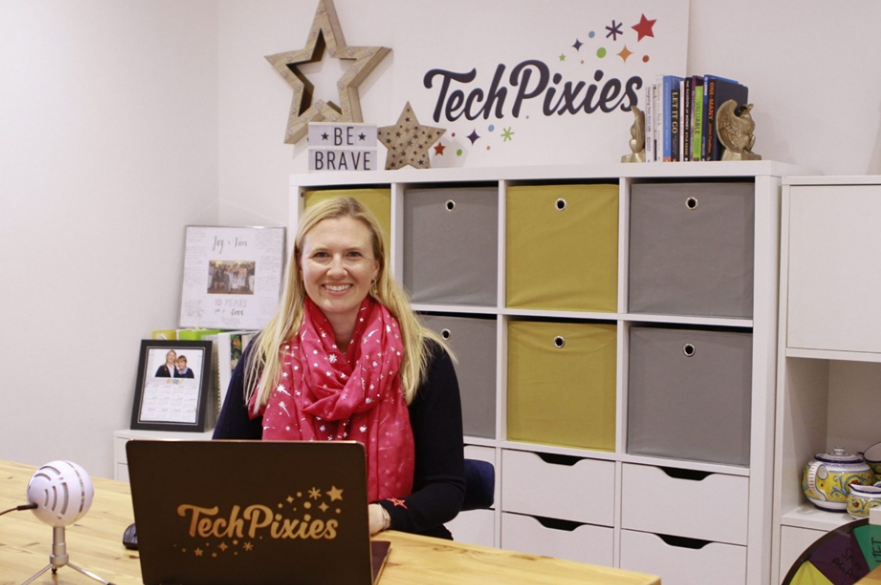
Image of TechPixies™ Founder Joy Foster at Work, Source: TechPixies™ used with permission
How IP rights safeguard small business and need to be managed is fundamental aspect of running a contemporary digital online business. Every business has certain key IP rights include copyright and trademarks. Janice and Joy discuss the purpose of an IP audit, the need to keep accurate records of IP rights, the role of the UK Intellectual Property Office (UKIPO) trade mark registry, searching for trademarks, how to register a mark (word mark, logos) with Pantone colours and the use of trade mark symbols for unregistered ™ and registered marks® aligned with domain names are all important considerations for digital firms. Over time, SMEs such as TechPixies™ will benefit from their IP rights portfolio in terms of growth, intangible asset value, differentiation from competitors, and potentially generate revenue from licensing leading to corporate longevity.
Janice suggested TechPixies™ founder consider applying for the UK Intellectual Property Office’s IP Advance Scheme that supports SMEs with less than 250 employees who would benefit from specialist support in IP-related matters. Applications should be submitted to the UKIPO through a Business Advisor of the relevant regional partner, eg Innovate UK Business Growth (England).
The IP Research Group enjoyed coaching TechPixies™ to help identify their burgeoning portfolio of intangible assets and IP rights that will play a crucial role in shaping the company’s future success leading to corporate longevity (see J.Denoncourt. "Companies and UN 2030 sustainable development goal 9 industry, innovation and infrastructure." Journal of Corporate law studies 20.1 (2020): 199-235. To learn more about TechPixies™ check out their social media here:
Associate Professor Dr J Denoncourt, Nottingham Law School, Nottingham Trent University
An Interest in Intellectual Property Beyond Borders ... Introducing Darion Smalls
Our newest IP Research Group and NTU staff member shares his IP interests, professional background and aspirations:
My first Undergraduate degree is a Bachelor of Science in Diplomacy and International Relations with a minor in Asian Studies from Seton Hall University. Shortly thereafter I stepped into the legal field as a Legal Intern and Training Specialist for a nonprofit that advocates for vulnerable children. There I began to build a body of knowledge and best practices in the State of Florida for working with survivors of human trafficking.
From that role I transitioned to working with a global nonprofit that advocated for survivors of human trafficking as a Training and Technical Assistance which eventually helped me to transition to a role in Change Management. Within this nonprofit, technology that they were working on was the use of blockchain and other financial data to evidence wrongdoing. This was my introduction to blockchain and serves as a foundation for an area of interest which is the use of Smart Contracts to protect IP rights and evidence infractions.
The last several years however has been focussed on Business Analysis, Project Management, and Change Management. A consistent concern within the IP space is how to valuate IP and commercialise where damages have not yet occurred. My hope is that with my background, I can bring together the legal and commercial elements for an innovative and pragmatic offering academically for NTU and eventually clients.
Joining NTU as a Staff and Student Member
I joined NTU in 2020 as a Mature Undergraduate Distance Learning (DL) Law student. As an American, I knew that I wanted to move to the UK and practice law, but the steps in between were unclear to me. As this was my second degree, I knew that I wanted to learn from the mistakes of my first University experience in the US by focusing on education and being a part of the University community. I did so until I moved in January of 2022.
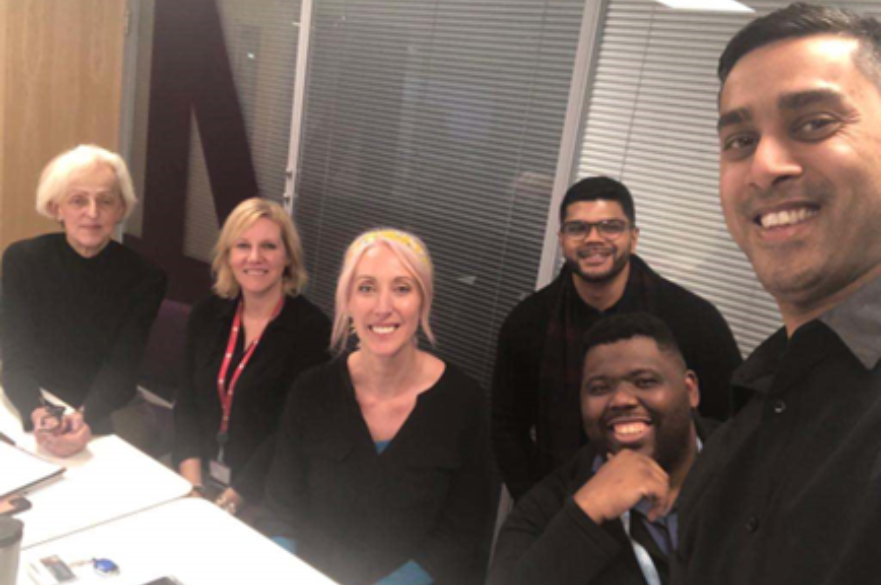
NTU welcomed me with open arms. In the same year that I moved, I began in my role as a Strategic Transformation Analyst on the Business Transformation Team (BTT) in the Strategic Planning & Change department.
In this role, I have had the opportunity to continue learning, growing, and participating on a team and in a community that allows me to prioritise educational achievement. It was due to theirs and other colleagues’ support around the University that I was able to complete my Law degree with a First-class distinction.
My final year also fostered a voracious interest in intellectual property and technology through the Intellectual Property module and researching for my Undergraduate dissertation; "From Black Box to Open Book: The Case for Reintroducing Formalities in Copyright Law to Safeguard Ownership Rights from Generative AI". I also had the opportunity to contribute to the Intellectual Property Awareness Network (IPAN) publication “IPAN Guide to the SDGs”.
Continued Study at NTU
This year, I have begun my study on the LLM programme in technology law. I want to better understand how technology can be regulated to protect individuals' intellectual property rights. My eventual goal is to build on my dissertation by evaluating various technological and policy-driven interventions.
I look forward to continuing to benefit from the exceptional education and ability to critically think that NTU provided in my undergraduate degree.
Areas of Academic Interest
Penn State University’s Law School published a 2019 study by Sidnee McDonald that analysed the impact of intellectual property on the wealth gap between different racial, ethnic, and gender groups. Due to this study and some independent studies, I believe that intellectual property will be the most significant wealth generator for the foreseeable future. Many people do not fully grasp their rights and engage with technologies (such as AI) that can materially impact them (and, by proxy, their wealth potential) in profound ways. My hope academically is to extend the work from my Undergraduate dissertation to reasonable technical and policy interventions which may help rights’ owners commercialise and protect their works and if necessary, evidence infringement successfully to ensure equitable outcomes.
While my eventual goal is to practice in this area of law, I feel that there is a breadth of information of which I have barely scratched the surface. I welcome the opportunity to learn from and contribute to NTU’s IP Research Group.

Darion Richard Smalls
Strategic Transformation Analyst
Darion.smalls@ntu.ac.uk
Connect with me on LinkedIn
Michelle Okyere Reflects on the 2024 GlobalWIIN Conference
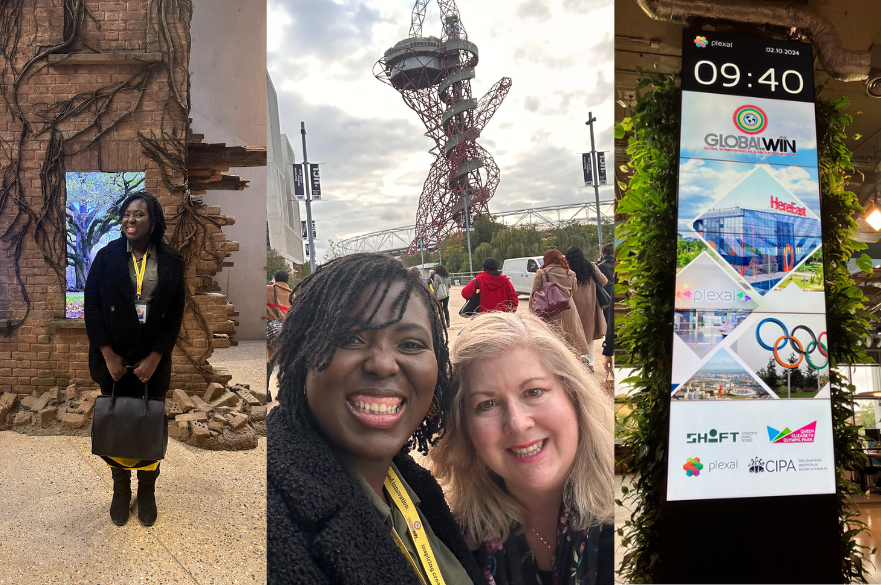
My October kicked off with a major dose of inspiration at the 2024 GlobalWINN (Global Women Innovators and Inventors) Conference themed, ‘Women Driving the Growth of Sustainability, Responsible Innovation and Inclusivity’.
Held at the Plexal Innovation Centre in Queen Elizabeth Olympic Park on 2nd & 3rd October 2024, this event was truly empowering. Thanks very much to my PhD Research Supervisor, Dr Janice Denoncourt, for facilitating the 2-day conference invitation. Dr Denoncourt was on the independent international judging panel, responsible for selecting the Female Innovator of the Year! 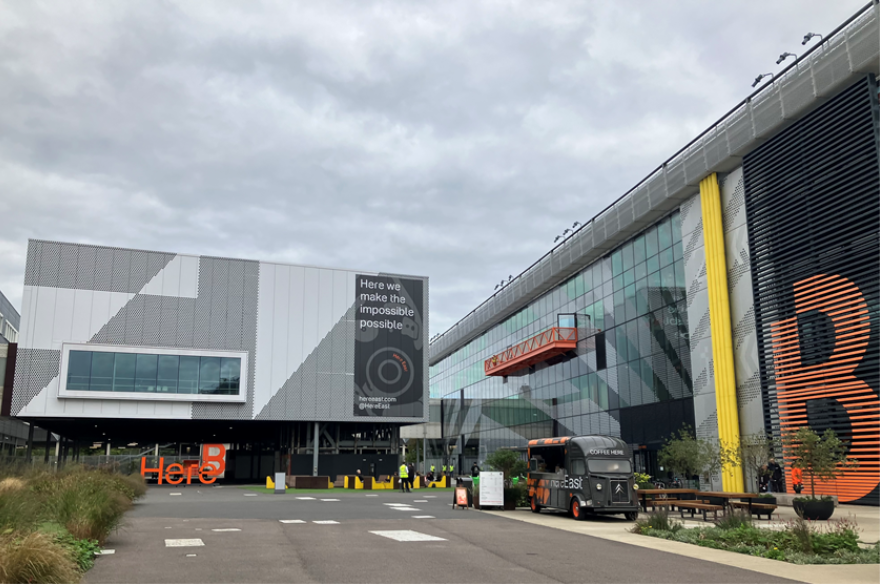
As an aspiring Intellectual Property (IP) lawyer and researcher with a focus on small and medium-size enterprises (SMEs), I was amazed by the incredible work being done by female innovators around the world. From automatic glass design moulding machines to advanced joint supplements and innovative birthing beds – the creativity was endless! The Overall Platinum Inventor of the Year Award Winner was Aino Mustonen of Finland for her Ecobond concrete, an alternative to cement made with patented energy-efficient technology from industrial by-products which is already approved and on the market in Finland.
I had the chance to network with many amazing women such as Sonjai Loikala and Karin Berghammer and dive into informal chats about the importance of protecting IP rights in these inventions. The conversations tied in perfectly into an insightful panel discussion on the value of IP for inventors, especially for startups with John Ogier, Janice Denoncourt and IP lawyer Phoebe Whitlock, Directors of the Intellectual Property Awareness Network (see www.ipan.org) a not-for- profit, committed to championing the importance and understanding of IP.
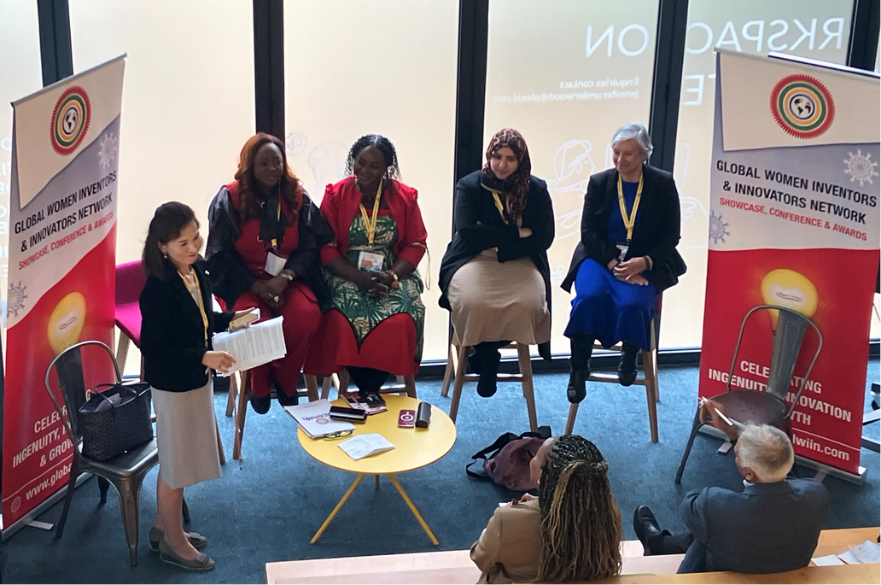
One of the standout moments at the conference was the panel discussion about the challenges women face when trying to register and scale up their businesses. Accessing finance in male-dominated industries came up as a recurring theme. A powerful message, however, echoed throughout the event: that women should never be afraid to speak their truth, no matter the barriers. 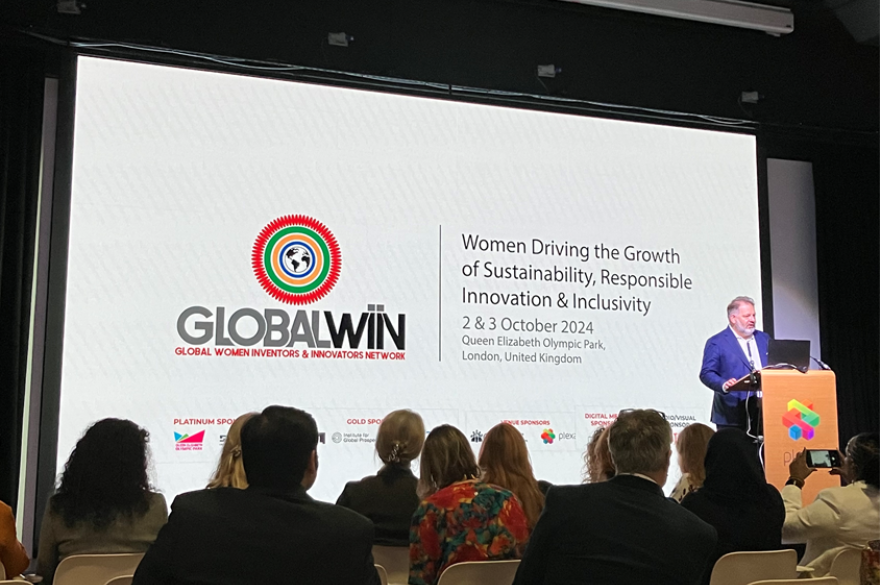
Kudos to GlobalWIIN founder and CEO, Dr Bola Olabisi (FRSA) also a Director of IPAN, for bringing together this remarkable community of women and organising such an impactful conference. For more information about how to get involved with GlobalWIIN see https://www.globalwiin.com/ Nominations for the 2025 Competition are now open.
Michelle Okyere (LLB, LLM, PhD Candidate, Ghanaian Attorney)
Stormy weather: Legal Context for the Autonomy Litigation involving British Tech Entrepreneur Mike Lynch, recently deceased
23 August 2024
Media attention focussed on the tragic passing of British tech entrepreneur, Dr Mike Lynch, warrants some legal context to explain the decade long legal battles he faced before the Bayesian Yacht sadly sank off the coast of Sicily last week. Read the full article here.
WIPO-UNIGE IP Summer School in Geneva: NN Khumalo Reports
I am thrilled to share my experience representing South Africa at the 14th edition of the World Intellectual Property Organization-University of Geneva (WIPO-UNIGE) Summer School on Intellectual Property (IP).
The IP Summer School is a two-week course that took place on 17-28 June with the first week at the WIPO Headquarters, and the second week at Geneva Law School.
This incredible journey, alongside 75 senior participants (graduate and postgraduate) from 40 countries, opened my eyes to the fascinating realm of IP rights in ways I could have never imagined.
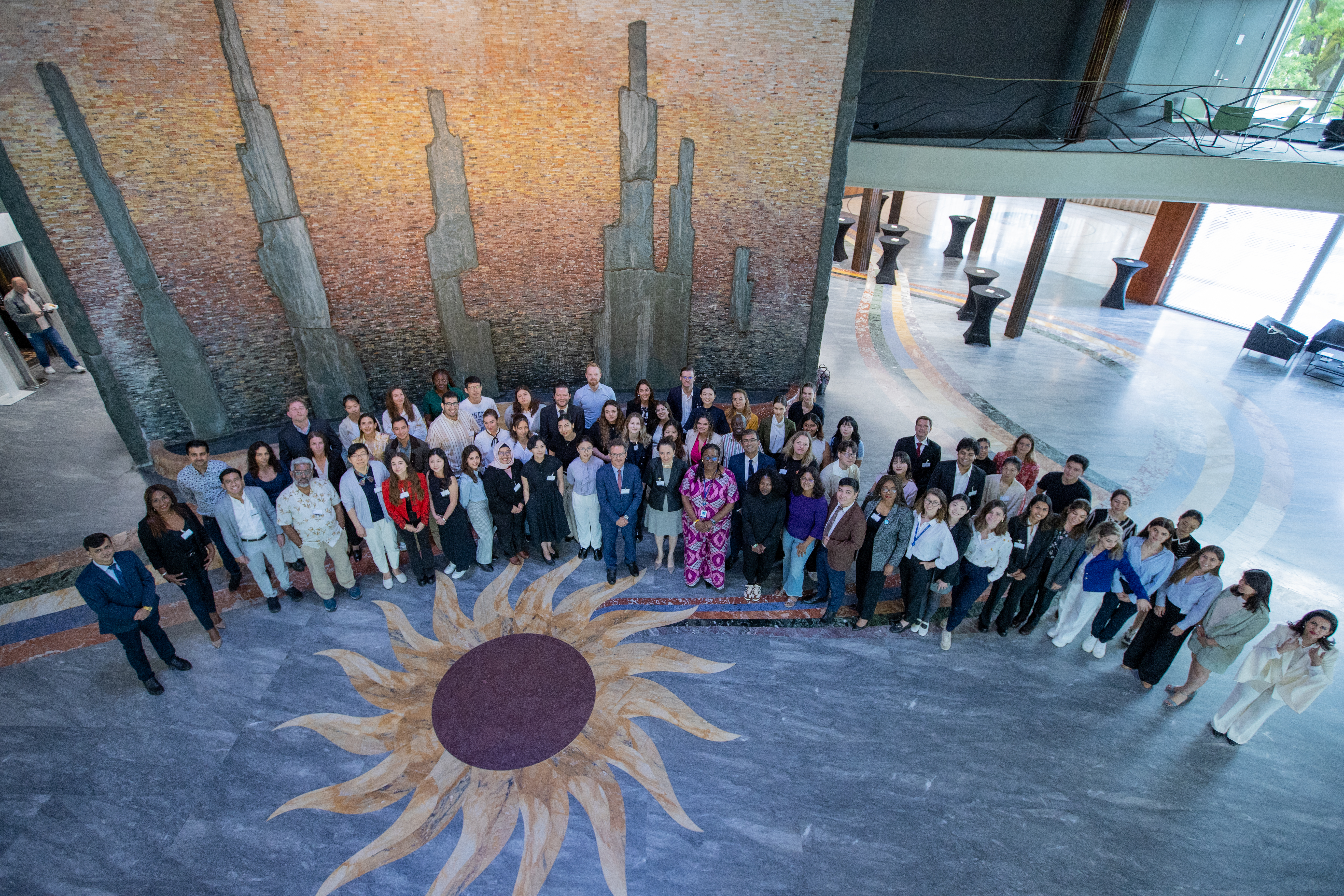
One of the most impactful moments for me was learning from Carlos Castro, Head of IP at the International Olympic Committee – IOC. His insights on the use of IP in the sports industry were invaluable. Carlos shared real-world examples that truly inspired me, showcasing the dynamic intersection of IP and sports.
Equally memorable was my involvement in the group focusing on IP & Sustainable Development in the fashion and luxury industry, led by the brilliant Olivia Dhordain, an IP Counsel specializing in the luxury sector. Olivia’s unique approach to storytelling as a method to engage and captivate audiences left a lasting impression. She emphasized how powerful narratives can be in conveying complex ideas, a lesson I am eager to apply in my future work.
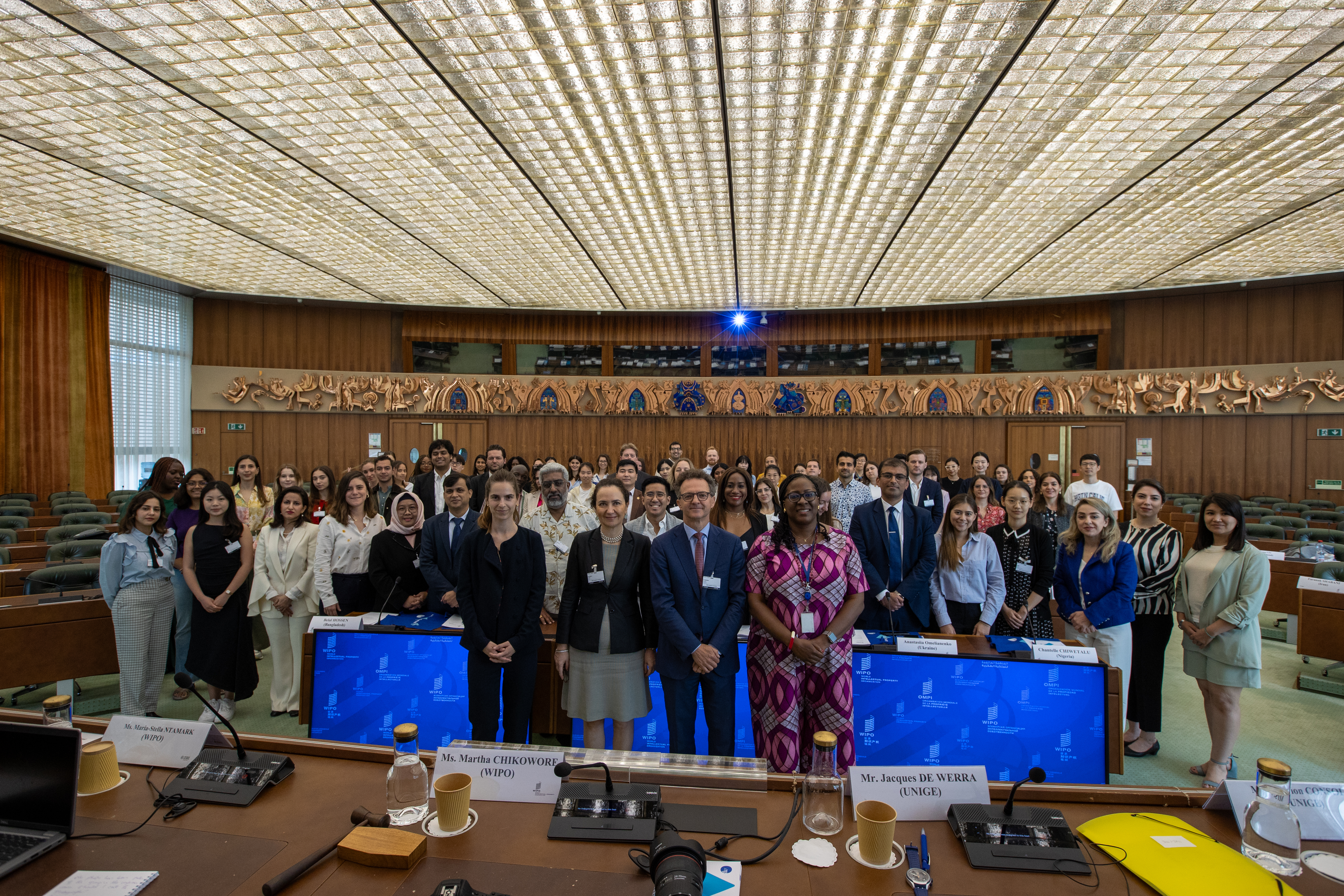
I must extend my heartfelt gratitude to the entire academic organizing team – Martha Chikowore, Maria-Stella Ntamark, Irene Calboli, Jacques de Werra, Marion Consoli, Lara Macedo, and Romain Giacobino. Their dedication and meticulous planning created a seamless and enriching learning environment that enhanced every aspect of the programme.
A special thanks to Associate Professor Janice Denoncourt and Nottingham Law School Module Leader for the LLM IP, Sport and Commerce and LLM Innovation and IP law modules. Janice’s passion for IP was the spark that ignited my curiosity and led me to this dynamic field. Her encouragement and enthusiasm were instrumental in my decision to explore IP further. I am deeply grateful for her mentorship and support.
The WIPO-UNIGE Summer School not only broadened my understanding of how IP drives innovation but also provided a platform for meaningful connections with professionals from around the world. I am eager to apply the knowledge gained to contribute positively to the field of intellectual property.
Ncamisile Nomfundo Khumalo
NLS LLM 2023-2024
REVITALISED AND INSPIRED:
MY EXPERIENCE AT THE 42ND ATRIP CONGRESS
As a young researcher navigating the throes of the intellectual property (IP) law space, attending the recently concluded 42nd International Association for the Advancement of Teaching and Research in Intellectual Property (ATRIP) Congress in Rome was a transformative experience. Being in the vibrant city of Rome, with its cultural and historical richness, was exhilarating. It stirred up my creative juices and provided a stimulating environment for intellectual exploration. The conference was a wonderful way to engage with a leading organisation and gain invaluable insights from seasoned researchers in the field, which will undoubtedly shape my future research and career.
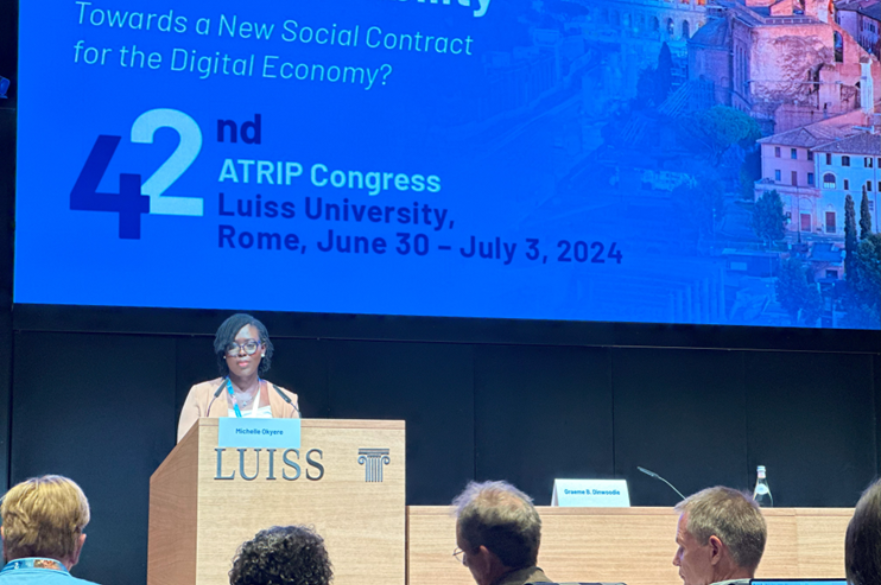
This year ATRIP was organised by Luiss University and focused on the theme of ‘IP, ethical innovation and sustainability’. I was privileged to be among the 12 PhD students selected to present at the Doctoral Students workshop.
My presentation focused on Geographical Indications (GIs) and non-agricultural products in Africa, with a comparative analysis of ceramics from Italy and Morocco. I provided recommendations on how Deruta ceramics from Italy and Fes pottery from Morocco can be made economically, socially and environmentally sustainable through the promotion of GI laws and practices. A key takeaway from presenting at the workshop was the importance of presenting research succinctly and precisely. The PhD Workshop, which required us to present our research in just five minutes, was an excellent exercise in distilling the core of my work, making it more accessible and beneficial for both myself and the audience.
Listening to the diverse presentations over four days offered a deep dive into the main aspects of current IP law research. The knowledge gained and connections made with other PhD students and esteemed researchers such as Niharika Salar, Jeremy de Beer, Irene Calboli, Leanne Wiseman, Dr. Samuel Andrews, Dr Chijioke Okorie, Dr Milton Lucido, Ivana Kunda, and Sofia Filgueiras were unparalleled. Meeting pioneers like Jerome Reichman and engaging with Professor Ruth Okediji provided plenty of new perspectives for my own work. Christopher Jon Sprigman challenged the basis of my research, prompting me to explore new angles, while Graeme Dinwoodie offered critical feedback to make my research more philosophical and impactful. It was especially exciting to reconnect with my mentor, Prof. Edward Kwakwa, the Assistant Director General at WIPO and key note speaker.

The conference sessions covered a wide range of topics, including trademarks, copyright, traditional knowledge and culture, patents, and artificial intelligence, offering a comprehensive overview of current trends and challenges in the field. The social events also provided great networking opportunities, where I was privileged to meet inspiring researchers such as Bryan Khan and Fiona Macmillan.
Congratulations again to the winners of the Doctoral Workshop presentations, Leona King Gabriele Cifrodelli, Maciej Padamaczyk. A huge congratulation to Lokesh, winner of the ATRIP Conference essay competition. As for the future of IP law research, we are poised to make significant contributions to the field.
Attending and presenting at this conference would not have been possible without the financial support of the Nottingham Law School and the encouragement of my Director of Studies, Associate Professor Dr. Janice Denoncourt, and my research supervisor Dr. Hakan Sahin. Their guidance and support have been instrumental.
A special thanks also goes to Janewa Osei Tutu, an incredible mentor and source of inspiration. Her continuous insights and advice have significantly contributed to the development of my research.
Overall, the workshop was a fantastic blend of intense learning and rewarding experiences. Here's to many more enlightening and enjoyable conferences ahead!
Michelle Okyere (LLM NTU, PhD in IP law candidate)
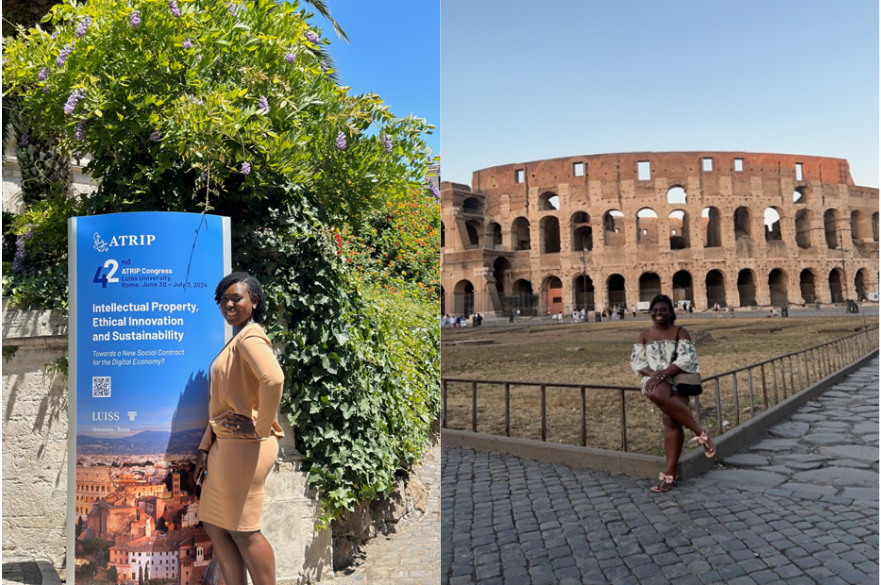
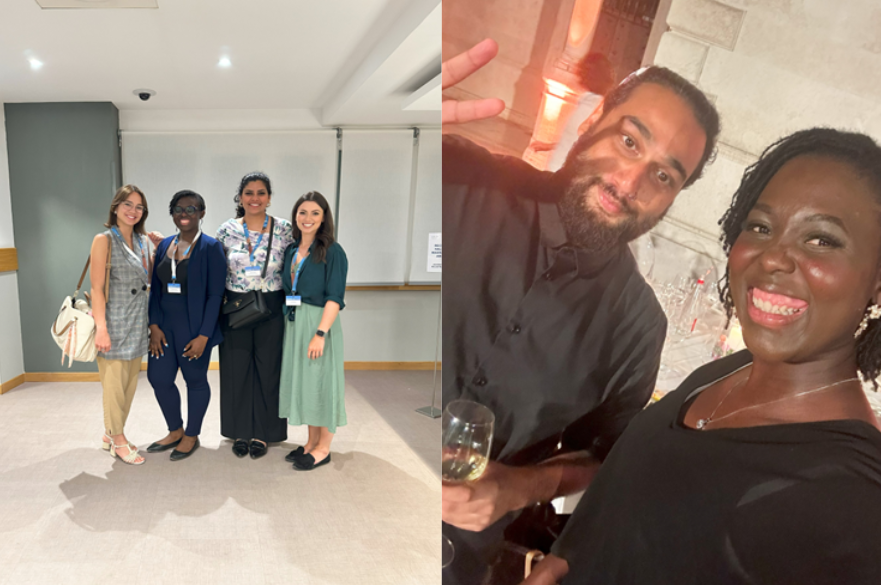
IP Awareness Network Virtual Expert Panel Discussion in Follow Up to 'IP & The SDGs' Report
11 July 2024

Register now for IPAN’s ‘IP & The SDGs’ virtual panel event on Thursday 11 July 2024 (12:00-13:30 BST)
On World Intellectual Property Day 2024 on 26 April 2024 and as part of our ‘IP & The SDGs’ programme launch, the Intellectual Property Awareness Network (IPAN) was pleased to publish its milestone report, ‘The IPAN Guide to the SDGs: Building our common future with innovation and creativity’. The Guide is an exploration of the 17 Global Goals through an IP lens featuring the expert perspectives and recommendations of key partners, members, practitioners and policymakers, all addressing the following question: ‘How does IP intersect with each of the Global Goals, and how might IP be used to advance innovation and creativity towards realising the Goals?’ Through this Guide, IPAN aims to bring IP and the SDGs ever closer together and to ensure that developments in intellectual property in the future have sustainability at their core from the outset of policy or project planning, rather than as an afterthought.
The topics and themes explored in the Guide will now be considered further at a virtual panel event which will be hosted by IPAN and our partners on Zoom in July 2024 and organised by the University of Exeter’s Dr Louise Loder (IPAN Secretariat).
For this session, which will take place on Thursday 11 July (12:00-13:30 BST), IPAN invites some of the report contributors, all senior leaders working in education, business / entrepreneurship, policy and practice, to share their insights into and expertise on key aspects and the interplay between intellectual property and the Sustainable Development Goals.
Organised by the University of Exeter’s Dr Louise Loder (IPAN Secretariat) and moderated by Phoebe Whitlock, IPAN Board Member & UK Delegate to UN Women, the session will welcome:
John Ogier, Chair of IPAN
Neil Lampert, Deputy CEO of the Chartered Institute of Patent Attorneys
Dr Janice Denoncourt, Associate Professor of Law, Nottingham Law School, Nottingham Trent University
Nisaa Jetha, Global Impact Strategist, Impact-for-SDGs
Dr Francesca Mazzi, Lecturer in AI, Innovation and Law, Brunel University London
Image Credit: ssi77/Shutterstock
We hope you can join us!
Janice
Associate Professor Dr Janice Denoncourt , LLM Innovation & IP Law Module Leader
UK and US Hewlett Packard v Autonomy litigation: highlights corporate technology, intangibles and IP right accounting standards and reporting reform
20 June 2024
One of the biggest British tech deals involved Autonomy, a software company created in 1996 by former Cambridge University academic Mike Lynch. The British and American litigation that ensued highlights the need for wider discussions regarding reforms to accounting for nebulous intangible assets such as software, copyright and licences. How are these valued, accounted for and reported in company annual reports?
With hindsight, the evidence showed that the sale of Autonomy to behemoth Hewlett Packard (HP) in August 2011 over a decade ago was unfortunately rather unsuccessful. Within a year of purchasing Autonomy and with it, access to its knowledge management software, HP identified concerns regarding Autonomy’s accounting practices – alleging serious accounting irregularities including misrepresentation and disclosure errors. HP subsequently wrote down the goodwill value by billions. In other words, HP overpaid for Autonomy. HP found that Autonomy's intellectual property rights and perceived overall value were worth much less than its due diligence was able to confirm. Litigation ensued on both sides of the Atlantic.
The UK’s Serious Fraud Office eventually terminated its criminal investigation into Autonomy due to ‘insufficient evidence for a realistic prospect of conviction’.
Meanwhile HP was sued by its own disgruntled shareholders under the UK Companies Act 2006.
HP in turn successfully sued former Autonomy CEO Mike Lynch and former Chief Financial Officer Sushovan Hussain in civil proceedings before the UK High Court to recover its financial losses. In his defence, Mr Lynch submitted that misunderstandings as to accounting differences between the UK and the US were the problem, not deliberate fraud. Namely, there were differences between international financial reporting standards (IFRS) use by Autonomy, and the generally accepted accounting principles (GAAP), the financial reporting standards used for US-based companies. Nevertheless, in January 2022, the Court held Mr Lynch and his CFO had fraudulently inflated Autonomy’s value by misleading HP about its performance: Autonomy and others v Michael Richard Lynch and another (17 May 2022) High Court of Justice Business and Property Courts England and Wales. At paragraph 40 of the judgment, the High Court identified the alleged improper practices included:
40.1. artificially inflating and accelerating Autonomy’s revenues;
40.2. understating Autonomy’s costs of goods sold by characterizing such costs as sales and marketing expenses so as to protect gross margins;
40.3. misrepresenting Autonomy’s rate of organic growth; and
40.4. misrepresenting the nature and quality of Autonomy’s revenues as well as overstating its gross and net profits.
The damages award in favour of HP is pending and will likely be circa £4billion or less.
Autonomy’s auditors were also subject to civil legal proceedings. The UK Financial Reporting Council (FRC) fined accounting firm Deloitte £15million for auditing failings of the Autonomy accounts between 2009-2011 related to hardware sales and software licences to value-added resellers, rather than to end customers.
In the United States, the Department of Justice (DoJ) initiated a criminal investigation. In contrast to the UK’s civil judgment, the US court has now found Lynch and Hussain ‘not guilty’ of all 15wire fraud and securities fraud charges. Lynch had been extradited from the UK to San Francisco where he was under home confinement having posted a $100USD million bond.
Decade long litigation history aside, the wider issue is that this type of financial hole calls into question the contemporary law and practice of corporate governance, financial reporting and accounting standards and the ability of professional auditors, accountants and lawyers during the due diligence phase to identify over-valuation more readily. Further, how should the system improve standards and practices related to accounting for intangible assets to better assist auditors, purchasers and investors?
Generally speaking, the disclosures of Autonomy's intangible assets, namely, software (copyright protected) and licensing are by their nature more difficult to value than tangible assets, leading to both over and under valuation. Accounting standard setters such as the International Financial Reporting Standards (IFRS), the European Accounting Association (EAA), and the UK Endorsement Board (UKEB) as well as academic researchers are working on how to categorise different types of intangibles, introduce taxonomies of common terminology and make recommendations to aggregate or disaggregate type of assets in order to elicit higher quality decision-useful information. This article distils the need for a new research agenda to tackle contemporary accounting in terms of granularity and comparability of intangibles, IP rights and licences to a wider audience.
Company directors should be interested in how accounting ‘faithfully presents’ intangible assets in their own country, and when the company trades internationally. In the UK, the accounts must present a ‘true and fair view’. Dr Lynch was the President of Autonomy, Inc. and subsidiary ASL and he owed legal duties as a company director. Directors are required to sign off the audited accounts. The CFO, Mr Hussain was held to be a de jure director of all three relevant subsidiaries, Autonomy Inc, Zantaz and ASL, and owed duties to all three.
Company directors, auditors, internal accountants and corporate governance professionals are in an increasingly difficult position. Intangible assets are prolific yet traditional approaches for valuing tangible assets such as computer hardware or plant and equipment do not map well to intangibles. Therefore, the risk of litigation for misrepresentation (innocent, negligent or fraudulent) is evident. Valuation and reporting of intangible assets is the new normal yet, intangibles is the term for a huge category of diverse corporate assets. One sub-set of intangibles is intellectual property (IP) rights. For example, Autonomy’s software may be protected as a copyright work under the Copyright Designs and Patents Act 1988 if it meets certain legal criteria. It is usually valued by the amount of copyright licensing revenue generated. The first allegation was that Autonomy's hardware sales was 'mischaracterised' as licence revenue. The legal issue is whether this was deliberate or not. It was alleged that both Autonomy's CEO and Finance officer had fraudulently (with knowledge) inflated the figures reported. Other intangible assets have other characteristics and will be valued differently.
However, the outcome of a series of civil and criminal court cases in two jurisdictions over 13 years turned on the applicable standard of proof. The criminal standard, proven ‘beyond a reasonable doubt’ was too high a hurdle for the prosecution to meet in the US. However, the UK High Court civil judgment decided ‘on the balance of probabilities’ handed down by the Honourable Mr Justice Hildyard stated at paragraphs 101-102:
101. This has been an unusually complex trial, 93 days long. Dr Lynch was cross-examined for 20 days. There was a database of many millions of documents from which there was extracted a trial bundle containing more than 28,000 documents. These documents have been the most reliable source of evidence. But there were also hundreds of pages of hearsay evidence, largely comprised of transcripts from previous proceedings in the United States, both civil and criminal.
102. Nevertheless, I have reached clear conclusions in these proceedings on the civil liability of Dr Lynch and Mr Hussain for fraud under Financial Services and Markets Act (FSMA), common law, and the Misrepresentation Act 1967, applying, of course, the civil standard of proof of the balance of probabilities.
From HP's perspective how the numbers added up in their valuation of the relatively young Autonomy technology firm mattered.
Setting fraud aside, the system needs to support stakeholders as to develop new norms and standards of transparency and disclosure expected for reporting corporate intangible assets. However, even the accounting standard setters themselves are not sure ‘Which Way to Go?’ with respect to International Accounting Standard (IAS) 38 Intangibles. International academic researchers such as the IFRS-EAA Intangibles Research Group were commissioned to produce a literature review and are currently working on evidence to underpin policy as how best improve the accounting rules related to intangible assets. A key component involves when to formally 'recognise' revenue of intangible assets during the business lifecycle and where such material figures and information should be reported - in the accounts, notes to the accounts or in additional narrative 'disclosures' where the company directors give explanations? The IFRS-EAA Intangibles Research Group is also evaluating court cases to study how best to ensure an appropriate governance and stewardship standard to reduce the risk of fraud and promote financial stability and the needs of our modern technology ecosystem.
Dr Janice Denoncourt
Associate Professor
ORCID ID 0000-0003-2176-8935
IFRS-EAA Intangibles Research Group
Director IP Research Group
Nottingham Law School
Nottingham Trent University
United Kingdom
Nottingham Trent University Academic Signs Book Contract with Publisher
18 June 2024
Dr Janice Denoncourt, Associate Professor in Law at Nottingham Law School, Nottingham Trent University, Nottingham, has signed a contract for her forthcoming book, Transforming Corporate Governance and Reporting: Intangible Risks, Technology, and Intellectual Property Assets with Taylor & Francis Publishing.
Jan new book will evaluate developments in corporate reporting that have taken place since her first research monograph Intellectual Property, Finance and Corporate Governance (2018, 2020) ISBN 9780367591410 was released, drawing on her extensive research in the field. Dr Denoncourt’s first highly successful research monograph was entered by Nottingham Law School into the C18 Law Unit of assessment of the UK’s 2021 Research Excellence Framework.
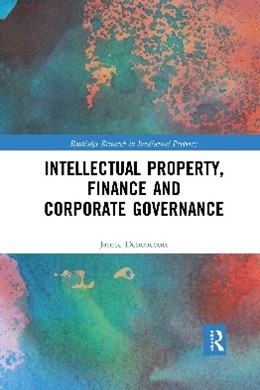
In her earlier work, Jan argued ‘IP law has evolved from being a little pool to a big ocean. Corporate governance needs to respond to society’s rising expectations of directors and boards as the impact of the global intellectual property ecosystem is felt.’ She advanced the key corporate governance principles of transparency and disclosure with a focus on patents to illustrate the legal issues. She analysed the juncture between the IP ecosystem; corporate finance, accounting for intangibles and the crucial role of corporate governance. According to World Cat Jan’s book is available in over 150 university libraries across 30 countries and five continents, evidence of its academic significance and reach. Her new book will analyse the seismic legal developments that have taken place since 2018.

Jan said, “I am delighted to have signed a contract with the leading publisher at the intersection business and law. I have wanted to write a new book that covers all the significant changes in corporate governance and reporting since COP26 took place in Glasgow. The creation of the International Sustainability Standards Board (ISSB) also brings with it new law that significantly advances corporate reporting of critical non-financial information including intangible assets and IP rights.”
Dr Denoncourt is a graduate of McGill University (BA), the University of Western Australia (LLB) and the University of Nottingham (PhD). She is a Graduate of the Australian Institute of Company
Directors and leads Nottingham Law School’s Intellectual Property Research Group. A book launch is planned for Spring 2025.
Janice’s first monograph, Intellectual Property, Finance and Corporate Governance may be purchased here.
Nottingham Law School staff & students contribute to World Intellectual Property Day 'IPAN Guide to the SDGs’
With forewords from John P Ogier, Chair of the Intellectual Property Awareness Network (IPAN); Adam Williams, Chief Executive and Comptroller-General of UK Intellectual Property Office; and Neil Lampert, Deputy Chief Executive, The Chartered Institute of Patent Attorneys, the Guide is an exploration of the 17 Global Goals through an IP lens.
The Guide features insightful contributions from NLS IP law academic Associate Professor Dr Janice Denoncourt, NLS Early Career Researchers Joseph Godfrey, Michelle Okyere; and IP Law Distance Learning students Rudolf Michael Kissler, Kevin Sattarzadeh and Darion Smalls. They address the following question:
‘How does IP intersect with each of the Global Goals, and how might IP be used to advance innovation and creativity towards realising the Goals?’
Over 30 IP lawyers, academics, entrepreneurs and students also contributed.
It also features the expert perspectives and recommendations of the IPAN Board and Secretariat, IPAN partners, members, practitioners and policymakers.
The IPAN Guide to the SDGs is available to download for free.
Introducing our New Intellectual Property Scholar Joseph Godfrey
The Intellectual Property Research Group is delighted to welcome another new member!
Joseph Godfrey is a fellow IP enthusiast and scholar who recently completed his LLM (specialising in IP law) degree at Cambridge University. He then became a Research Assistant with the Alan Turing Institute. Joseph has a strong interest in copyright law.
With diverse publications already to his name, Joseph examined aspects of reverse engineering software in his article published in the Intellectual Property Quarterly [2024] 1 IPQ 50. As an Early Career Researcher, Joseph is keen to expand his IP repertoire and tackle automated copyright enforcement (eg. social media website YouTube's ‘ContentID’ system), pirate communities as a model for media preservation, and the implications of generative AI for legal deposit libraries. Joseph says, ‘I plan to start my PhD at The University of Hong Kong next September. My research project has the working title: Home Taping Is Saving Music: Media Preservation in the Information Age’. An abstract of Joseph’s research is set out below:
Copyright's foremost function is to encourage the creation of works. It does not, however, provide adequate measures to preserve those works. All works will one day enter the public domain, but that is of little use when there are no copies of the work left to reference. Moreover, the loss of media presents a serious blow to our cultural heritage. Print fades, film decays, and discs rot; and sometimes copies just go missing. Loss of media seems like an inevitability, but it does not have to be, especially in this unparalleled era of technological capability.
Joseph further explains that his research aims to: (1) deduce which laws or amendments to laws would be particularly conducive to the preservation of media; and (2) ascertain the economic and societal costs and benefits of implementing such changes. Joseph will likely be supervised by Professor Haochen Sun.
The IP Research Group is delighted to have another new IP scholar in our midst. Currently, Joseph is employed as a Legal Research Assistant within Nottingham Law School. One of his tasks over the next few months involves assisting Associate Professor Janice Denoncourt with her interdisciplinary IP research.
Welcome aboard Joseph!
To contact Joseph, kindly email: joseph.godfrey@ntu.ac.uk
Dr Janice Denoncourt publishes new research on corporate reporting & Technology Readiness Levels (TRLs)
In Intellectual Property, Finance and Corporate Governance (2018, 2020) I argued that traditional corporate reporting is arguably not fit for purpose where technology capability and readiness is concerned due to lack of corporate disclosure. In this volume, I first mooted the use of the technology readiness level (TRL) system to enhance transparency and accountability. My new research advocates that as the TRL system is grounded in established ideas it can be transferred from the public to the private sector to benefit corporate reporting to support sustainability investment decisions.
Technology to support sustainable development is knowledge-based, tends to be complex and uncertain and often subject to long development periods. There are rising policy concerns regarding how corporate governance, which is inherently interdisciplinary, should deal with transparency and reporting of the growing range of new technologies. This uncertainty engages company directors and investors in a constant search for material non-financial information (NFI) to improve their decision-making. They seek accurate, timely and comparable NFI as to how a firm will leverage its technology responsibly to power its business model, information often buried in lengthy integrated annual reports.
New communication tools are needed to enhance communication, primarily with shareholders, but that may also benefit stakeholders and the wider community. My new chapter evaluates the TRL system as a potential tool to aid corporate reporting of technology progress. The TRL system is a globally engrained method of estimating the maturity of critical technology elements on a scale of one to nine, with nine being the most mature technology. Assigning a TRL between 1 - 9 signals to the market the technological capability and readiness of new innovations. A key advantage is the system provides 'comparable' NFI regarding the state of technology progress and commercialisation.
Most lawyers, bankers and accountants are not familiar with the TRL system. I became familiar it in the late 1990s as in-house legal counsel for a publicly listed mining technology company when I was more closely involved science and engineering. My company had acquired an interesting patent portfolio of certain non-explosive rock-breaking technology inventions based on American space rocket technology. The documentation referred to TRLs.
Whereas its origins lie in the public finance sector via NASA, I present arguments and logics that suggest the advantages of using the TRL system in corporate reporting and disclosure outweigh the disadvantages. The aim is to support 'faithful representation' as to how well technology disclosure statements reflect underlying technical and scientific variables. However, at present there is no common, technology-neutral, or preferred way of presenting non-financial technology information in corporate management and annual reports, which can be used to verify the reliability of the reported information. The interdisciplinary analysis builds a possible shared understanding from corporate governance, transparency, and accountability standpoints.
To read more see: Chapter 16 which features in Intellectual Property Rights in the Post-Pandemic World (1 December 2023) J. Mahonen, T Pihlajarrine and P. Upreti (Eds), Edward Elgar Publishing, pp316 ISBN: 978 1 80392 273 7 available to order here.
Associate Professor Dr J Denoncourt, Nottingham Law School, UK
Director, Intellectual Property Awareness Network (IPAN) see www.ipaware.org
[1] On 11 March 2020, the World Health Organization (WHO) declared the novel coronavirus (COVID-19) outbreak as a global pandemic (WHO Director-General’s opening remarks at the media briefing on COVID19 –March 2020).
Dr Janice Denoncourt IP Coach and Strategist for YABOUY™ Gambian IP Gold Award Winner
Imagine visiting the local Tanji fish market where you can buy fresh local produce to slow-cook your meal Gambian-style, with time to chat, learn about the local cuisine, fashion and culture, singing and playing games before enjoying your aromatic fish dish from the Atlantic Coast. Well, that is all part of the YABOUY™ home cooking experience.
Mrs Ida Cham Ngai, a vibrant, successful businesswoman from the Gambia was awarded the Intellectual Property Awareness Network’s (IPAN) Gold IP Award at the virtual ceremony held on 2 December 2021 during the Covid-19 pandemic. I am delighted to have supported Global Women Innovators and Inventors Network (GlobalWINN) founded by IPAN director, Dr Bola Olabisi FRSA for the past few years as Judge on the panel of international competition judges.
I caught up with Ida virtually on 18 December 2023. I heard exciting new developments regarding YABOUY™, her unique sustainable food and culture tourism business based in sunny Gambia.

Nigel Worth, John Ogier and Janice Denoncourt, IPAN’s resident IP Rights and Strategy Coaches, learned about exciting new developments that have taken place since the Covid-19 pandemic. YABOUY™ is on the cusp of a new way to share Gambian foodie culture - working with a cruise liner to provide passengers with local ‘cultural experience’ day excursions!
The IPAN Coaches discussed a variety of strategies for Ida to identify, protect and maximise a variety of IP rights for YABOUY™. Beginning with an IP rights audit, the session covered IP strategies in an African context, among other business and social media strategies. YABOUY™ has a well-established online presence online, on FB, Instagram and YouTube.
Dr Olabisi explained how the coaching session really provides Ida and YABOUY™ with the opportunity to reflect on the growth of the business while becoming more aware of the various IP implications and benefits. Ida expressed her appreciation for such an amazing opportunity as she is dedicated to “preserving her culture to promote sustainable tourism”.
Janice Denoncourt
IP Research Group Welcomes New Member Marie White
We are delighted to welcome a new research-active member to our friendly Intellectual Property Research Group based in Nottingham Law School. Marie White is working within the Law School as an hourly paid lecturer (HPL) at Nottingham Trent University. She is also studying for her DPhil in Law at St John's College, University of Oxford.
Marie advises that,
I am particularly interested in socio-legal debates in intellectual property law. My doctoral research focusses on the implications of approaches to branding as a practice in sociology. The cultural and marketing studies for the doctrinal approach to branding adopted by courts and registries in trade mark disputes is also of interest.
Marie has been involved with teaching on the LLB IP Law on the Academic Undergraduate Programmes.
IP Coaching the 2023 GlobalWIIN Gold Award-winning Inventor Entrepreneur
Unnur Valdis Kristjandottir, the 2023 Global Women Inventor and Innovator’s Network (GlobalWIIN) IP Gold Award winner, explains how being an IP rights owner worked for her.
She discusses the impact of the IP Gold Award and how the recognition has helped her improve her IP awareness to support her Iceland-based business, Flothetta®.
Unnur invented and designed the Flothetta® float cap which is patented and trade mark protected. The Flothetta® float cap is an innovative water wellness therapy accessory product, designed to support a deep and relaxing water experience and supports independent floating in any water to relax, reduce muscle and skeleton stress and promote emotional and mental overall body-spirit connection. Her successful business is thriving in Iceland and the Flothetta® product line is sold at the world-famous Blue Lagoon wellness resort. See Unnur’s website to learn more.

Unnur explains,
For centuries, Icelanders have enjoyed the healing properties of water, such as the relief of stress and the improvement of the general well-being. Flothetta® adds a new dimension to the water experience, one of relaxation and total bliss.
On 7 November, an IP strategy coaching session was led by Associate Professor Dr Janice Denoncourt (IP Research Group Lead, Author and non-practising lawyer). She was pleased to discuss Unnur’s future IP strategy for Flothetta® as a member of the IP Awareness Network (IPAN) panel. John Ogier (IPAN Chairperson) and Nigel H. Worth (IPAN Director, Chairperson, International Licensing Practitioners, IP lawyer and Consultant). GlobalWIIN CEO, Dr Bola Olabisi joined as an Observer. Between them, the panel members have decades of IP strategy experience to share with Unnur.
Unnur told us how her business has largely grown through word of mouth. Her products and float therapy courses are now available in over 20 pools in Iceland. Although Unnur is poised to scale up and expand beyond Iceland, this requires additional reflection, finance and support. The panel advised on the importance of an IP audit annually, branding and a possible franchise model.
Flothetta®’ fantastic success has meant Unnur quickly become aware of copycats sold online. She was incensed to discover unauthorised copies of her products on the Amazon® USA Web Shop. A David and Goliath effort ensued and Unnur offers the following advice to fellow designer entrepreneurs:
Establishing the Flothetta® brand was such an important investment of my time and limited resources. Owning the IP rights, enabled me to pursue Amazon. It took some effort, but Amazon actually removed the copycat products from their site! My trade mark is one of my most valuable business assets.
‘My IP awareness has absolutely increased as a result of my IPAN coaching session’ said Unnur. She is currently investigating expanding the Flothetta® brand more widely with the world. We are thrilled for Unnur and look forward to watching her business progress over the coming years.
International Innovation Judge Dr Janice Denoncourt at the 25th Anniversary GlobalWIIN 2023 Conference in Iceland
The Global Women Inventors and Innovators Network (GlobalWIIN) is a unique group founded to support entrepreneurial women making worldwide impact. It celebrated its 25th anniversary at the prestigious Harpa Concert Hall and Conference Centre in Reykjavik, Iceland on 6-7 September 2023. The event’s inspiring motto “WOMEN4SOLUTIONS & SUSTAINABILITY” embraces a multifaceted approach which included a conference, study visits, and a gala awards ceremony.
Nottingham Law School’s Associate Professor Denoncourt was a member of the international judging panel chaired by Mark Sheehan, President of the Inventors & Patentees Association (IPI), British Library Inventor in Residence. Ahead of the event, Janice and fellow judges were involved in intense assessment of over 50 applications before selecting the final award winners.
Ms Elinora Inga Sigurdardottir FRSA, Vice President of the International Federation of Inventors’ Associations-IFIA, President of the European arm of GlobalWIIN (EUWIIN), and Chair of KVENN in Iceland, inaugurated the event.
GlobalWIIN 2023 featured an impressive line-up honorary speakers. A highlight was the virtual presence of H.E. Eliza Jean Reid, the First Lady of Iceland. Her Excellency was joined by Ms. Bryony Mathew, British Ambassador to Iceland, representing the Foreign, Commonwealth and Development Office, Reykjavík, and Ms. Carrin F. Patman, U.S. Ambassador in Iceland. These eminent women emphasized the significance of innovation, creativity, and the pivotal role of women inventors and entrepreneurs in global leadership and sustainable development.
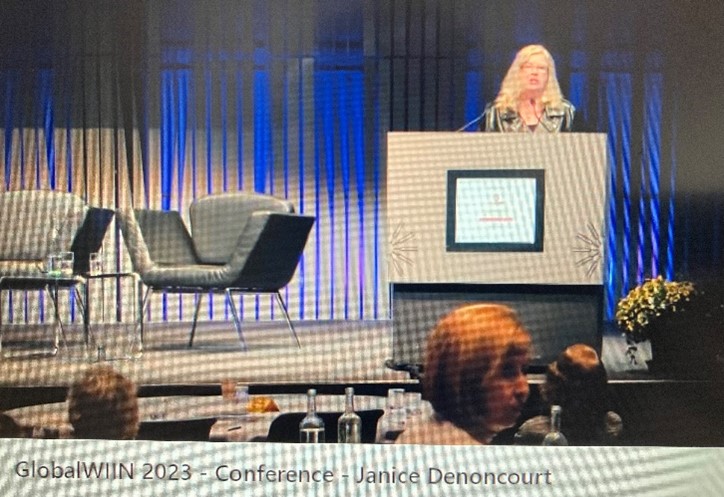
Associate Professor Denoncourt spoke on 'Unlocking the Power of Your Intangible Intellectual Property Assets'. The link to her talk aimed an inventor entrepreneurs on the GlobalWIIN YouTube Channel.
The programme included a series of opportunities for the entrants to 'pitch' their inventions to potential investors Dragon's Den style which was an excellent new addition to the GlobalWIIN programme.
Three esteemed male guests addressed the gathering: Andri Heiðar Kristinsson from Digital Iceland, Chief Dele Momddu, Chairperson of Ovation International Nigeria, and Masoud Shafaghi Strategic Planning Officer from the International Federation of Inventors’ Associations-IFIA. These organizations have been instrumental in bridging diverse communities and promoting women’s participation in addressing global challenges.
The 15th Anniversary event continued with two days of informative and scientific panels. The first panel covered: “Raising Awareness on Intellectual Property (IP),” “A Discussion on Marketing and the Raising of Capital,” and “Vibrant Journeys in Women’s Shoes,” where successful women shared their insights and experiences. On the second day, participants enjoyed scientific visits to two renowned Icelandic establishments: (1) the Geothermal Energy Exhibition, showcasing Iceland’s remarkable geothermal energy infrastructure, which plays a pivotal role in sustainable development and (2) the unique LAVA SHOW, a world first, which educates visitors about volcanic eruptions in a safe environment.
The grand finale of GlobalWIIN 2023 took place at GAMLA BÍÓ where winners received their awards. Dr Denoncourt awarding the Intellectual Property Awareness Network (IPAN) Intellectual Property Gold Award to Unnur Valdis Kristjabsdottir for her invention and design of a Flothetta® float cap which is patented and trade mark protected in Iceland. The Flothetta® float cap is innovative water wellness therapy accessory product, designed to support a deep and relaxing water experience and supports independent floating in any water to relax, reduce muscle and skeleton stress and promote emotional and mental overall body-spirit connection. See www.flothetta.com
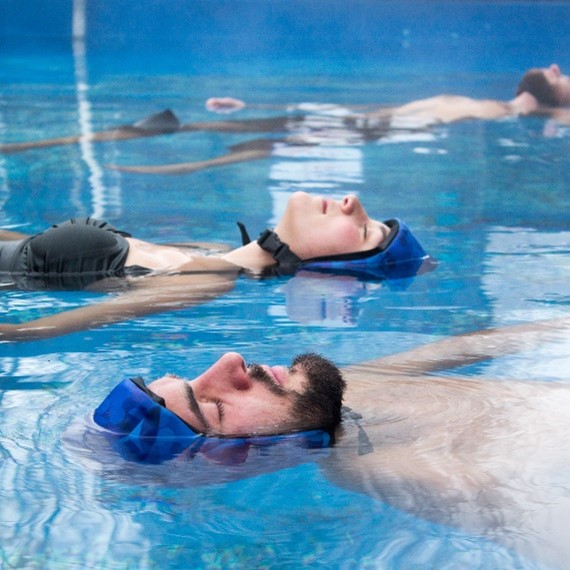
The event concluded with the presentation of awards in various categories, celebrating the outstanding achievements of individuals and organizations in innovation. Nottingham Law School’s IP Research Group is delighted to support GlobalWIIN. GlobalWIIN’s 25th-anniversary celebration was a testament to the remarkable contributions of women in the world of innovation and their essential role in driving sustainable global development.
For more information about GlobalWIIN and its initiatives, please visit https://globalwiin.com.
Canada and the UK in a Changing International Environment: The 50th Anniversary Colloquium Report Launch at the UK House of Lords
Tuesday, 18th July 2023, was an exciting day for me in London. As I made my way from Westminster station to the Black Rod entrance and through security to be admitted to a Committee Room in the House of Lords, I had time to reflect. I had now lived in the UK for as long as I have lived in Canada. We share Charles III as our head of state and after years teaching ‘English Legal System’ I was about to experience my first ever visit to the Upper House of the UK Parliament.
The occasion? An unexpected yet very welcome ‘by invitation only’ event, the UK-Canada Council (CUKC) was celebrating the launch of the 50th Colloquium Report entitled, Canada and the UK in a Changing International Environment.
As the group was ushered in, I met a variety of interesting people including a banker, a mining CEO, a naval commander, an economic attaché and a journalist, among others. Old and new professional acquaintances! These encounters brought back good memories of an earlier time in my life when I was more directly involved in international relations. First as a military Visit Liaison Officer for captains of visiting naval warships and then as Aide-de-Camp for a Governor General. The setting felt familiar.
Over the last two years I had become more involved in the British Association of Canadian Studies (BACS). This group interests me as a UK-based academic with a Canadian and Quebécoise heritage. I had the good fortunate to be awarded the Prix de la délégation de Québec à Londres earlier in the year for a corporate governance research project on the topic ‘Challenging Financial Opacity: Examining New Corporate Transparency Obligations in Quebec and implications for UK firms’. The UK-Canadian relationship goes deep as we share many common values as liberal democracies, yet in my opinion this relationship tends to be undervalued. Yes, certainly it is more convenient to learn from countries with a shared language, but ideology also matters. It is less well-known that Canada has the most highly educated population in the world according to the OECD (2018), yet the Britain has educated more serving heads of state at university level than any other – a real soft power (Higher Education Policy Institute (2017). Indeed, I came to live, work and study in the UK as a result of the award of a fully funded British Council Chevening Commercial Law Scholarship. My mind was filled with the potential for comparative Canadian and UK law themes.
Settling into our seats, we each received our own copy of the new Report, with a supportive foreword by the UK Prime Minister Rishi Sunak no less.
Our host, Lord Hayward, a dedicated rugby fan and campaigner for gay rights, welcomed our group of about 50 leaders in their respect fields – political, diplomatic, military, economic, academic and journalistic - to the Colloquium.
The Colloquia, alternating each year between the UK and Canada, are opportunities to strengthen enduring bonds. Passing the 50 year-mark, this is one of the longest standing bilateral policy fora of its kind, actively supported by the Prime Ministers’ Offices and foreign ministries of both countries. The Canadian High Commission is based in London and the Government of Quebec has a representative office at 59 Pall Mall. The UK’s High Commission is in Ottawa, with Consulates-General is several Canadian cities (Montreal, Toronto, Calgary and Vancouver).
Anthony Cary CMG, UK Co-Chair and former UK High Commissioner to Canada (2007-2010) introduced last December's Colloquium and the new 2022 Report. The report format presents a series of opening propositions followed by a synthesis of the responses by way of knowledge exchange. On this day, the lead discussants provided critical, yet candid, commentary followed by suggestions from those assembled to generate ideas as to how the two countries could further collaborate in an international context to meet specific policy objectives. Several invitees succinctly contributed their interdisciplinary perspectives on a wide range of pressing regional and global challenges facing Britain and Canada, from north to south and east to west, a veritable global analysis. It struck me that a better understanding of ‘complexity theory’ is needed as every aspect of our lives is being reshaped by innumerable disruptive events. Change is a threat, but there are also opportunities. Complexity theory studies a variety of disciplines with profound implications for the way we think and act within the world (Schneider & Somers, 2006).
As an academic with Canadian and UK qualifications from McGill University (BA) and the University of Nottingham (PhD), it was decidedly good to learn that a central goal of the Canada-UK Council is to nurture scholars who are ‘movers and shakers’. My participation has already directly benefitted my research, through the timely establishment of important contacts on the topic of corporate governance norms.
Although the UK and Canada have been historically and economically linked for centuries and in many policy areas where the lessons easily translate, the law often takes interesting turns so there is always more to learn from each other.
Thanks to the event co-sponsors which include the Foreign, Commonwealth & Development office, Canada House (La Maison du Canada), Innovation, Science and Economic Development Canada, City of London, Atomic Energy of Canada Limited, the Munk School of Global Affairs & Public Policy and the Park Group.
Associate Professor Dr Janice Denoncourt, Nottingham Law School
See https://www.cukc.net/about
Twitter: @JanDenoncourt
LinkedIn: https://www.linkedin.com/in/janice-denoncourt
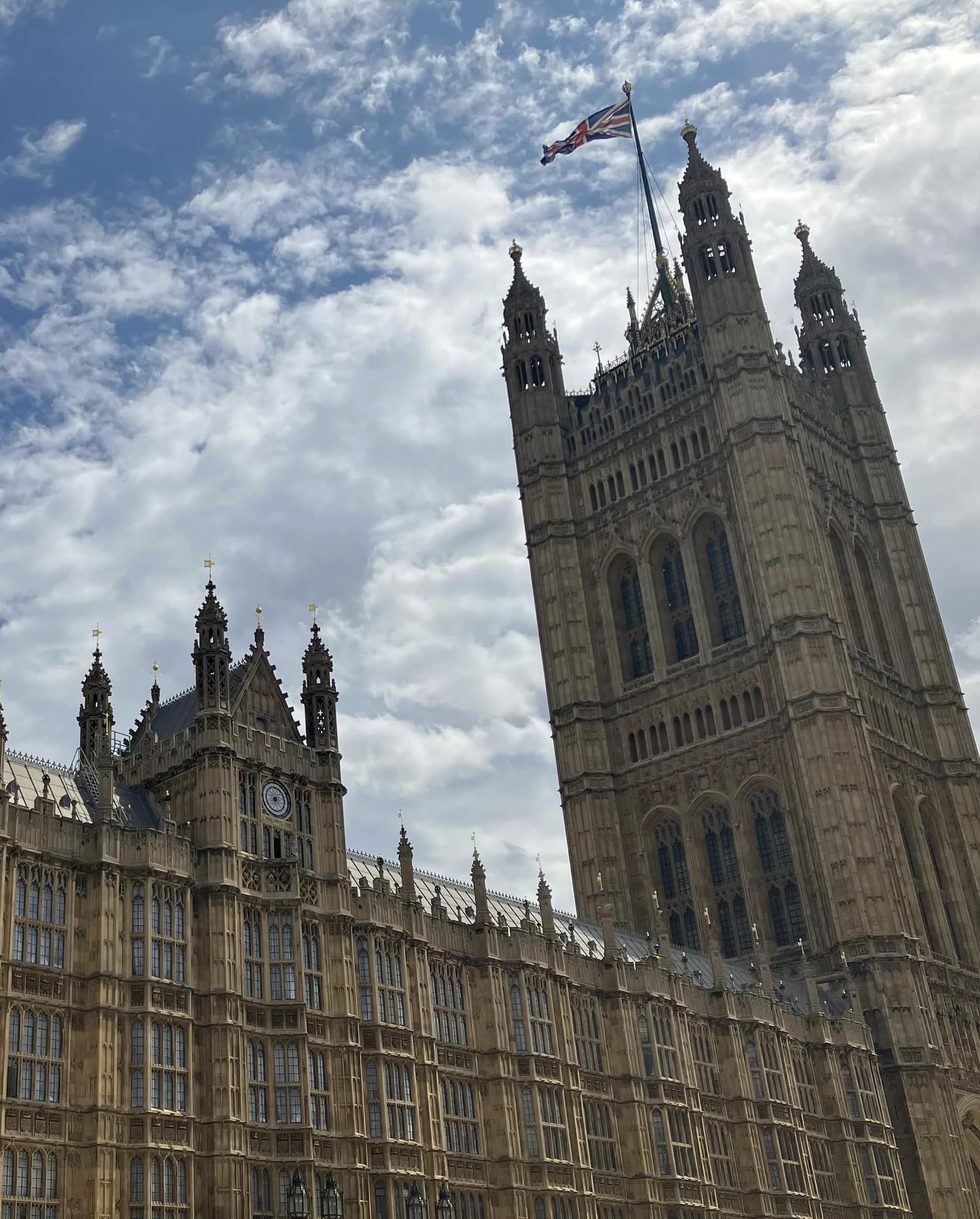
Nobel Prize Summit 2023 - Truth, Trust and Hope:
Associate Professor Dr Janice Denoncourt reflects on her visit
Dr Janice Denoncourt had the pleasure of being invited to attend the opening day of the globally renowned Nobel Prize Summit in person on 25 May, held at the National Academy of Sciences (NAS) building in Washington D.C, USA. The Global Conversation focussed on the theme ‘Truth, Trust and Hope’ a topic of global importance. The Summit organizers, Vidar Helgesen, Executive Director of the Nobel Foundation and Marcia McNutt, President of the US NAS stated, “With the 2023 Nobel Prize Summit we will promote scientific method, critical thinking, and constructive dialogue.” Day 1 was divided into two parts: Making Sense of Information and The Truth is Out There, followed by Day 2 Forum of Experts and Day 3 participating in Solution Sessions. Janice says,
I was thrilled and honoured to have been invited to attend the Nobel Prize Summit in person and visit the incredible National Academic of Sciences in the capital of the USA. I also attended a fascinating ‘Solution Session’ hosted by the Swedish Embassy. Engaging with an incredible group of people and connecting was an important part of the event. I met the Canadian Ambassador to the US, a Nobel Laureate and many experts at the top of their fields. It was a truly inspiring. I was one of only a handful of attendees from the UK. The concepts and messages resonate for my interdisciplinary legal corporate governance, reporting of intangibles and intellectual property rights transparency and digital environment research.

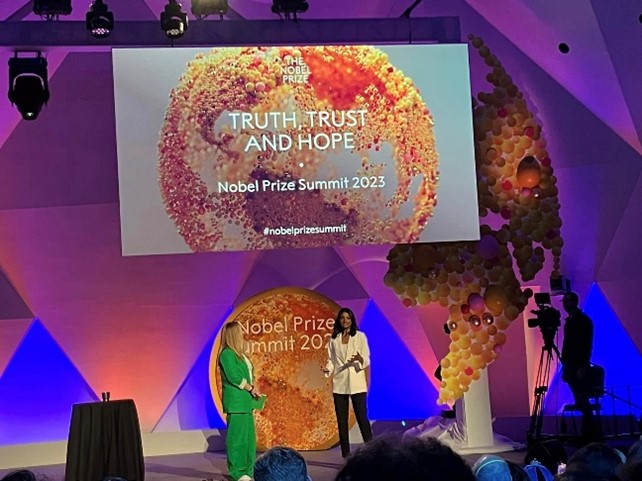
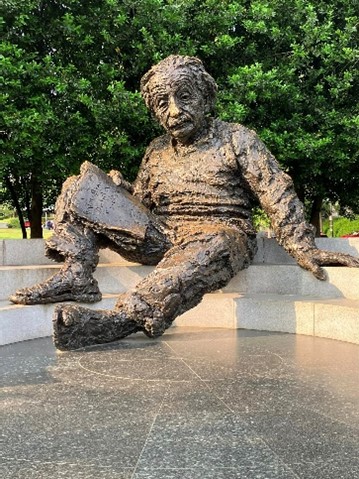
IP Research Group contribution to New IP Education Book
The book launch of Teaching IP Law, Strategy and Management will take place on 21 June 2023. The event is being hosted by University College London at UCL Laws, Bentham House, London.
Dr Janice Denoncourt contributed a Chapter to the new book edited by Jacques & Soetendorp. All three, and many of the books’ contributors are members of the European Intellectual Property Teaching Awareness Network (EIPTN) based at Bocconi University.
Janice will deliver a presentation on fostering and integrating sustainability awareness IP law education. Dr Denoncourt’s chapter will enable IP educators to consider the rationale for integrating the UN 2030 Sustainable Development Goals (SDGs) and the annual WIPO IP Innovation Index into IP law and innovation teaching, learning and assessment. The book launch will form part of the inaugural Teaching IP Law, Strategy and Management Conference. For more information about the new book, see Edward Elgar Publishing.
Dr Janice Denoncourt joins the UKIPO’s IP in Universities & Colleges Stakeholder Group
Earlier in April, Dr Janice Denoncourt, an intellectual property rights expert, was invited to join the UK Intellectual Property Office’s IP in Universities & Colleges Stakeholder Group. This is the UKIPO’s main stakeholder group, managed by the IPO’s Knowledge Exchange and Education Policy (KEEP) Team.
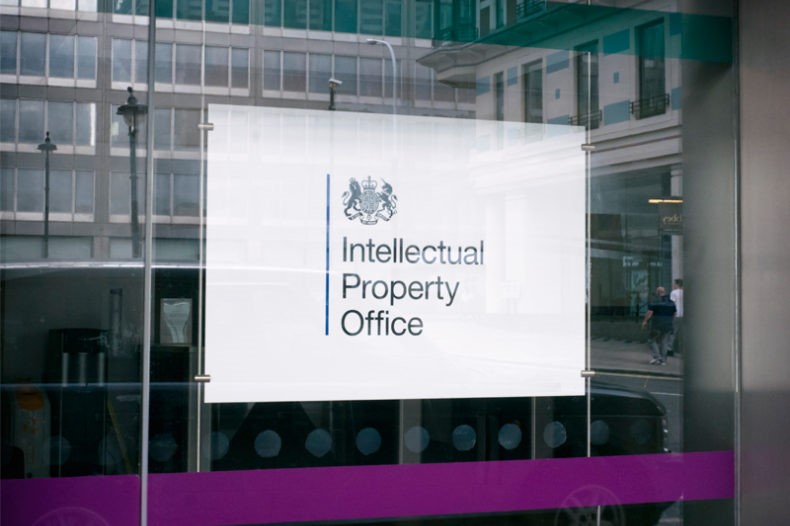
The aim of the group is to provide a strategic overview and steer on IP in innovation, share good practice and identify areas for possible engagement. Membership is by invitation only, and comprises representatives from academia including government, higher education institutions and representative organisations. Janice recently participated in her first quarterly meeting to discuss the UKIPO’s new Intellectual Asset Management free online resource that will be launched shortly. Janice has previously contributed to the UKIPO’s Horizon Scanning Exercise to assist shape the UKIPO’s research and policy agenda.
IP Research Group Lead, Dr Janice Denoncourt, celebrates World IP Day at the Institute of Directors in London
Held at the historic Institute of Directors in Pall Mall, London IPAN's returned to its first 'in person' knowledge sharing event on 26 April 2023 with a fabulous panel of experts and Q&A session and was a resounding success. This year, the theme was 'Women and IP: Accelerating Innovation and Creativity' with a panel of experts discussing the successes of women in the creative industries and the challenges they face in accessing and protecting IP. The speakers included Dr Janice Denoncourt, a Director of IPAN, with special guests, IPAN members and attendees including our NLS PhD IP Scholar, Ms Michelle Okyere. The Expert Panel, Q&A and networking reception was heled at the elegant Institute of Directors (IoD) in London.
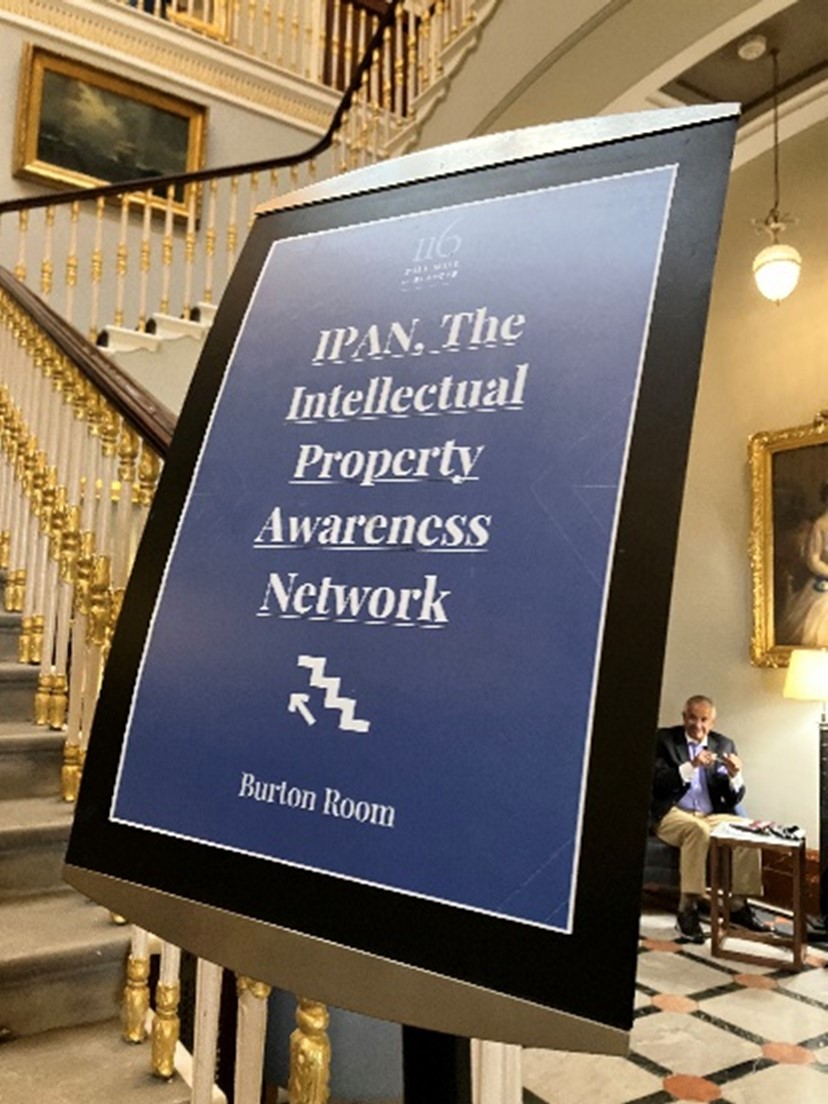
This very special event was chaired by IPAN Chairperson John Ogier, who welcomed speakers Penny Phillpotts from the Intellectual Property Office UK; Andrea Brewster OBE, Lead Executive Officer of IP Inclusive and former President of The Chartered Institute of Patent Attorneys Attorneys; Kristen Tapping, Entrepreneur and Product Design Engineer, currently developing GoRolloe, a startup that creates air filtration devices for vehicles to capture harmful particulate matter in urban areas; Sarah Talland, trade mark attorney with Potter Clarkson LLP; Dr Bola Olabisi FRSA, Founder & CEO of GlobalWIIN (which she set up in 1998 in recognition of the challenges that women face in bringing commercially viable products and breakthrough developments to market) with GlobalWIIN & IPAN Award Winner Patience Nwodu FRSA - Inventor and creator of Chibu Reusable Carriers; and Associate Professor Dr Janice Denoncourt, Nottingham Law School, Nottingham Trent University and Author of 'Intellectual Property, Finance and Corporate Governance' (2018).
The World IP Day event was exceptionally well-attended by over 50 guests representing IP law firms, academics, practitioners, inventors, creators and entrepreneurs. During the event, IPAN Chair John Ogier presented a gift on behalf of IPAN's Board, Members and Partners to Professor Emerita Ruth Soetendorp for her decades of dedication to the IPAN mission as a valued member of the IPAN Board.
Further, the event was sponsored by partners Potter Clarkson, Briffa, The Chartered Institute of Patent Attorneys, and Sybaris Legal & IP.
View the photos and video reel
If you wish to become a Member of IPAN today for priority and complimentary invitations to future IPAN events and initiatives please contact Dr Denoncourt or visit the website.
For further information on IPAN’s mission, stakeholder engagement initiatives and partnership opportunities, please get in touch with the IPAN Secretariat.
Dr Janice Denoncourt of Nottingham Law School awarded the Prix de la Délégation générale du Québec à Londres
On Friday, 21 April 2023 at the British and Canadian Studies (BACS) Conference 2023 held at Senate House, University College London, Associate Professor Dr Janice Denoncourt of Nottingham Law School was awarded the Prix de la Délégation générale du Québec à Londres. The prize is administered by the BACS Awards Committee and has been awarded for research on Quebec for the past 37 years.
The Prize is awarded for the best proposal to carry out research involving Québec. Dr Denoncourt's comparative Quebec-UK law research project involves examining the new corporate transparency and disclosure law which recently came into force in Quebec and will impact on UK businesses seeking to register in the province. The research will form a strand of her corporate governance, transparency, and disclosure project, and contribute to Nottingham Trent University’s Connecting Globally research theme.
The Agent-génerale of the Quebec Government in London, Madame Line Rivard, a former Bank of Montreal banker, was there to present the prize.
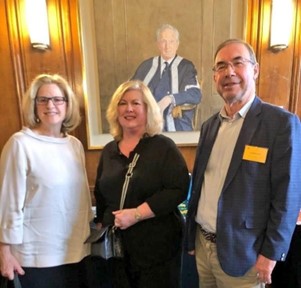
Dr Janice Denoncourt with Agent-génerale Madame Line Rivard & Associate Professor Tony McCulloch, BACS President.
The BACS Conference took place at Senate House, University of London, from Thursday 20 to Saturday 22 April 2023. There were about 20 speakers and 50 attendees from 9 different countries. This was the first in-person BACS Conference since 2019 and there was lots of positive feedback from those present during and after the conference.
September 2022
Nottingham Academic appointed to Academic Advisory Group on accounting standards reform
Janice Denoncourt has been appointed to the Academic Advisory Group (AAG) , set up by UK Endorsement Board (UKEB). The UKEB influences, endorses and adopts new or amended accounting standards issued by the International Accounting Standards Board (IASB) for use by UK companies.
15 September 2022
NLS Researcher to present at Cambridge University EPIP Conference 2022
In September, one of our own researchers from the NLS Research Group will present their work at the following significant international conference on 14th-16th September:
European Policy for Intellectual Property (EPIP 2022) Conference
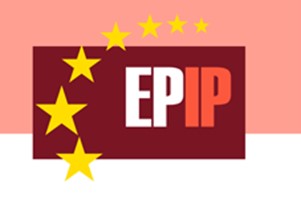
Source: Cambridge University
The 17th Annual Conference of European Policy for Intellectual Property (EPIP) will take place in Cambridge, UK, from 14 to 16 September 2022, hosted by the Innovation and IP Management (IIPM) Laboratory and the Centre for Intellectual Property and Information Law (CIPIL), University of Cambridge.
The theme of the conference this year is: “Opening IP for a better world?”
The conference brings together academics in diverse fields such as economics, law, management science and political science as well as stakeholders and policymakers for theoretical, empirical and policy-oriented presentations and discussions on IP rights asst protection, technology and innovation.
Associate Professor Dr Janice Denoncourt will present, ‘Impact of new Sustainable Development Standards on Corporate Reporting of Intangibles and Intellectual Property Monopolies’. She sheds light on the pioneering new International Sustainability Standards Board (ISSB) guidelines which elevate the status of non-financial information such as corporate intangibles and IP right assets, when material.. Additional narrative corporate disclosure in annual reports for example, is a crucial step in achieving a higher level of corporate transparency and ‘opening IP for a better world’. See www.epip2022.org for additional information.
12 September 2022
Introducing Joanna Wisniowska, new NLS IP Research Group
Joanna is a newly appointed lecturer at NLS and a PhD candidate at the University of Nottingham. She joined the IP Research Group in September this year.
Joanna is completing her doctoral project developing an original theory of interpretation of the so-called patent morality exception tailored to the structure and judicial organisation of the newly created Unified Patent Court expected to begin its operation in 2023. She has been supervised by Prof. Paul Torremans and Dr Andrea Tosato and is currently awaiting her viva voce examination.
Joanna obtained her qualifying master's degree in law at Jagiellonian University in Krakow (Poland) – Faculty of Law and Administration, which is known for its well-established Intellectual Property Institute being the largest IP research centre in Poland, maintaining a close collaboration with WIPO and the Polish Patent Office. During her studies, Joanna began her specialisation in private law and intellectual property. For the last two years of her studies, she attended seminars organised by Prof. Elzbieta Traple. During this time, she prepared a dissertation titled: The Effects of Commencement of Winding-up Proceedings on Intellectual Property Licence Agreements, which was one of the first pieces analysing the newly enacted Polish Restructuring Act 2016 and including a reform proposal with a special focus on the protection of parties of copyright and patent licence agreements.
Following graduation, Joanna moved to the UK and obtained a Magister Juris degree at the University of Oxford. During her studies at Oxford, Joanna has continued her specialisation in intellectual property, as well as corporate law and financial markets regulation. After obtaining her MJur degree, Joanna returned to Poland and practised law in a top-tier firm specialising in intellectual property law, IT law, and Technology Media and Telecommunication. She was involved in the works of the Patent and Trademark Team and IT-Telco Team. She offered comprehensive legal services to clients from private and public sectors, including technology, pharmaceutical, beauty, literary, and fashion industries, whilst also involved in legal works surrounding major infrastructural projects in Poland. She was mainly responsible for trademark- and registered designs-related cases, including proceedings before Polish authorities and EUIPO in Alicante.
Joanna’s research interests include trademark and patent law, with special focus on European and international intellectual property law. She is particularly interested in interdisciplinary topics at the intersection of IP law, commercial law, corporate finance, insolvency law, and law and biotechnology. At present, she is engaged in a collaborative publication project, "Edgar Encyclopaedia of Intellectual Property", supervised by distinguished IP scholars from around the world, aimed at drafting a complete guide on all areas of intellectual property law. Her colleagues Adam, Ezinne and Janice are also contributors.
June 2022
Spotlight on UCL’s Annual Sir Hugh Laddie Lecture 2022
Associate Professor Janice Denoncourt is a Director of the IP Awareness Network (IPAN) an independent think tank in London. Her fellow IPAN Director Mandy Haberman’s experience of patent infringement was selected by Professor David Vaver, keynote speaker, to illustrate Mr Justice Laddie’s intellectual property cases. Sir Hugh Ian Lang Laddie (1946-2008) was a High Court judge and thought leader in the IP law field with a corpus of case law judgments delivered over three decades.
Source: Creative commons licence
Held annually, UCL’s Annual Sir Hugh Laddie lecture was chaired by Professor Sir Robin Jacob (UCL). Professor Vaver of Osgoode Hall Law School, University of Toronto and the University of Oxford (Emeritus)), is a Fellow of the Royal Society of Canada and Member of the Order of Canada. He delivered a lively lecture with the curious title, ‘'Mr Justice Laddie and his intellectual property cases: Of millefeuilles and a fish called Elvis’. The hybrid live event was streamed globally, attracting a large in person audience to UCL’s Institute of Brand and Innovation Law at the Cruciform Lecture Theatre in London on 22 June.
IPAN Director Jan Denoncourt is delighted to report that when discussing Justice Laddie's patent cases, Prof Vaver selected Mandy's patent infringement litigation: Haberman and V and A Marketing Limited v Jackel International Limited (Pat C 15 Jan 1999). In fact, discussion of Mandy Haberman’s case closed the lecture with Prof Vaver displaying his Haberman cow design Anywayup® cup as a prop.

Source: Creative Commons licence
Mandy is the founder and director of Haberman Global Innovations (see www.habermanbaby.com). She is a renowned product designer and inventor, awarded the British Female Inventor and Innovative Network (BFIN) Female Inventor of the Year 2000.
The famous patent case decided by Sir Hugh Laddie concerned Mandy’s non-spill cup technology (Anywayup®) that revolutionised the global nursery baby feeding products market. Her success has led to copycats including the legal battle against Jackel International Limited (Tommy Tippee® brand). The patent infringer Jackel had deployed a common tactic, namely arguing that Mandy’s invention was obvious. Sir Laddie clearly disagreed, deciding in favour of Haberman noting in his judgment,
1) the technology answered a long felt want (ie. for a cup that sealed automatically and was totally non-spill when out of the child’s mouth;
2) the answer to the problem was simple and the solution had been under the noses of those in the industry - but they hadn’t seen it; and
3) the product achieved rapid commercial success.
Therefore, Mandy’s invention wasn’t obvious. Justice Laddie concluded, ‘The development was sufficiently inventive to deserve monopoly protection.’
Since then, Mandy has accrued over 30 years’ experience safeguarding her valuable IP rights. She is recognised authority on corporate theft and patent infringement, going on to successfully defended her own IP beyond the UK in the USA and Europe. See www.mandyhaberman.com
During the Q&A session, fellow Jan was proud to mention Mandy’s ongoing work with IPAN and the Global Women’s Inventors and Innovators (GlobalWIIN) to an audience mainly of academics and practitioners. Professor Vaver said he had the great pleasure of serving on an IP Committee with Mandy an inventor with extensive IP expertise in her own right. Mandy explains to entrepreneurs:
Must have innovation, combined with ‘wow’ factor design is the secret of success, but the serious commercial value lies with your IP. As an inventor, it is important to understand how the patent system works and to do as much as you can to protect your IP before you share information. I knew the AnyWayUpCup® had great commercial potential, so I spent a lot on intellectual property rights, registering patents in all my strategic markets – but it paid off! My patents held up. By protecting my ideas, I was finally able to secure my position in the market and reap benefits from years of hard work. The AnyWayUpCup® technology revolutionised the nursery market. Valved cups are now the standard worldwide. I would have lost everything if I had allowed people to continue infringing.
The above material was originally published in J Denoncourt et al publication Degree shows & Displaying Your Creative Work (2016) pp22-23.
Call for papers
Perspectives for Post-COVID 19 Recovery and Sustainable Development:
A Law and Development Discourse
Dr Ezinne Igbokwe is pleased to announce a call for papers for a one-day hybrid in-person and virtual Workshop, generously funded by the Society of Legal Scholars (SLS). The Workshop is being jointly organised by Dr Augustine Arimoro of Roehampton University School of Law and Dr Igbokwe of Nottingham Law School.
Workshop theme:
Perspectives for Post-COVID 19 Recovery and Sustainable Development:
A Law and Development Discourse
Event description:
This Workshop will consider the effect of the COVID-19 pandemic globally and the strategies for recovery. The periods of lockdowns and the challenges faced highlighted the need for the protection of specific people groups including LGBTI, the elderly, persons from minority communities and persons with disabilities. The COVID-19 pandemic has placed undue pressure on healthcare services around the world and in the United Kingdom. There have been reports that the numbers of confirmed cases and deaths were vastly underestimated especially during the first and second waves of the pandemic. There were challenges with tests and tracing as well as with the enforcement of lockdown in some parts of the globe, especially in countries in the Global South where adequate relief was not provided for citizens who were being mandated to remain at home during the initial lockdowns in March to May 2020. The lockdown down in some parts of the world brought significant hardships with the closure of businesses such as restaurants and the ban on international travel.
With less than eight years to the 2030 target for the United Nations Sustainable Development Goals, there is a need to play catch up given that the pandemic has set the entire globe backwards. The Workshop aims to propose strategies for global recovery post-COVID-19 as the world works towards attaining Agenda 2030. The Workshop will consider what role law and legal frameworks can play toward global recovery, especially in law and economic development, law and technology, law and the environment, Intellectual Property and human rights law. We intend to invite speakers from different global contexts that have engaged in discussions in this area of law and practice. The focus will be to suggest proposals to policymakers on ways to approach the recovery process.
Papers are invited to discuss sustainable development in relation to the following areas (non-exhaustive guide):
- Human rights
- Law and development
- Law and the environment
- Law and technology
- Law and intellectual property among others
Abstract Submission Details:
Abstract of no more than 250 words (excluding title) should be submitted via email to augustine.arimoro@roehampton.ac.uk copying ezinne.igbokwe@ntu.ac.uk
The deadline for submissions is August 5, 2022. Speakers will be notified by August 10, 2022.
Papers should be presented in no more than 20 minutes.
Event details:
Date: 15th (Thursday) September 2022
Time: 10:00 – 16:00
Cost: Free (Food included) – This event is funded by the Society of Legal Scholars Small Projects and Events Fund
Location: Court Room, Mandela Building, Roehampton Law School, University of Roehampton, London, UK
For more detailed information please contact:
augustine.arimoro@roehampton.ac.uk copying ezinne.igbokwe@ntu.ac.uk
May 2022
India-UK IP Scholars Celebrate World IP Day 2022: Youth and Innovating for a Better Future
On 4-6 May. the inaugural India-UK International Virtual Intellectual Property Conference to Celebrate World IP Day took place over 3 days, jointly organised by the IP Research Group and NTU Global, together with our institutional partner Panjab University, Chandigargh, India.
India and the UK's IP ecosystems were explored from a variety of perspectives.
J Denoncourt gave a keynote speech on 'Youth and Innovating for a Better Future'.
Special guests from the UK included:
Huw Watkins, Head of Asia Policy, UK Intellectual Property Office, Wales, UK
Prof. Cillian Ryan, Pro-Vice Chancellor (International)
Professor Jane Jarman, NLS IP Research Group
Eminent speakers from India included:
Prof. R Tewari, DPIIT-Chair, Panjab University, Chandigarh
Prof. Raj Kumar, Vice-Chancellor, Panjab University, Chandigarh
Dr. Yogesh Pai, DPIIT-IPR Chair Professor, National Law University, Delhi
Dr. Jatinder K Arora, Exec. Director, Punjab State Council for Science & Technology, Chandigarh Prof. Raman Mittal, Faculty of Law, University of Delhi, Delhi; Visiting Professor, Faculty of Law, University of Oxford, Oxford, UK
Dr. Parvinder K Maini, Scientific Secretary, Office of Principal Scientific Advisor, Govt. of India Prof. Devinder Singh, Chairperson, Dept. of Laws, Panjab University, Chandigarh
Special World IP Organization (WIPO) Guest:
Alex Riechel, Head, TISC Development Section, IP for innovators Department, Geneva, Switzerland.
Over 110 people attended the Day 1 Inaugural Session virtually.
On Day 2 Indian and UK IP experts shared their research from socio-economic; jurisprudential, IP management, commercialisation, technology transfer and IP education perspectives.
'The IP PhD Research Journey' was a special session in which three of NLS' early career researchers and PhD scholars contributed sharing their PhD research journeys:
Dr Ezinne Igbokwe
Dr Adam Buick
PhD candidate Martin Szarkiszjan.
The event showcased NLS' vibrant IP research capability and doctoral research culture.
"The IP Research Journal panel showcased a wide range of research interests, from IP in pharmaceuticals to protection for geographical indicators in India and the challenges to current IP norms posed by the emergence of AI. I presented on my own "IP research journey" from undergrad to lecturer, and my research on IP rights in pharmaceutical test data as well as the impact of the internet of the use and value of trade marks.
This session demonstrated the wide range of activity within IP research, and why scholars come to be interested in IP. I learned a lot and am looking forward to seeing how the research of my fellow presenters develops in the months and years to come." – Adam Buick
The programme of speakers was jointly organised by NTU Associate Professor J Denoncourt and Panjab University's Professor Rupinder Tewari and Professor Devinder Singh.
On Day 3, Professor Jane Jarman and Peter Vaughan, IP Research Group members, presented a well-received talk on ‘From Class Room to Court Room: Lessons from Integrated Approach to IP Education’.
The conference culminated with a lively Roundtable on 'Stimulation of the IP Ecosystem in the Academic Sector' moderated by Professor Tewari and Dr J Denoncourt with the participation of Professor Jane Jarman and Mr Peter Vaughan.
Many thanks as well to NTU Global's Stephen Williams, Ms Vidhi Sahae and Dr Vasileios Adamidis who facilitated the joint event.
We estimate that over the course of the 3-day event over 200 people joined us.
April 2022
Sustainability, Coloured Gemstones and Cultural Heritage: New Research by Associate Professor Denoncourt
Supporting Sustainable Development Goal 5 Gender Equality and Entrepreneurship in the Tanzanite Mine-to-Market. Sustainability 2021, 13, x. https://www.mdpi.com/2071-1050/14/7/4192
Creating a sustainable future can be controversial especially in the mining sector in Africa, with the need to balance environmental concerns, alleviate poverty, and create employment opportunities leading to economic empowerment of women.
This article tackles those thorny questions. Tanzania has been blessed with a highly desirable unique resource, Tanzanite – the mesmerising purple-hued gemstone, that will be forever associated with the country. Dr Denoncourt analyses how a strategy for Tanzania’s tanzanite coloured gemstone mining sector could foster gender equality in the mine-to-market (M2M) supply chain, whilst enhancing opportunities for female entrepreneurship as part of the country’s sustainable economic development. In the mining industry, the contemporary concept of mapping artisanal and small-scale mining to the UN Sustainable Development Goals is a newer aspect of sustainability.
Drawing on personal experience and interdisciplinary research in mining law, sustainability, entrepreneurship and intellectual property rights, Dr Denoncourt provides an original analysis of post-colonial small scale artisanal coloured gemstone mining and economic empowerment opportunities for women. Before turning to academe, Associate Professor Janice Denoncourt worked as a laboratory analyst at BHP-Billiton’s remote Mt Newman Mine—the largest open pit mine in the world located in the vast Pilbara region of Western Australia. This led to a legal career beginning in the mining and resources section of Freehill Hollingdale and Page (now Herbert Smith Freehills) Perth Office and then as in-house corporate counsel for a publicly listed Australian mining technology company which carried out mining activities in South Africa.

J Denoncourt is on the left, second row, in an underground South African mine
Dr Denoncourt argues that despite initiatives to support gemstone mining in Tanzania and East Africa, the role of women in the lucrative tanzanite M2M supply chain has been less visible and a missed opportunity. This is a concern, as in 2019, pre-COVID-19 pandemic, gemstone and precious metals accounted for an incredible 33.2% of Tanzania’s total exports. In contrast, in leading mining countries such as Australia and Canada, the participation of women continues to steadily advance, economically empowering the women involved. She writes that gender equity is an under-rated economic dimension of the sustainability ethos in the artisanal mining sector, which due to its income generation capacity, holds immense promise long-term sustainable development in Africa. Her new original work contributes a critical review of Tanzanian mining regulation and licensing practice in an historical and gender equality context, where men have long benefited from licences to mine in the best areas of the tanzanite mines.
At the front end of the mine to market (M2M) supply chain, Dr Denoncourt explains the developed world experience of increasing levels of gender participation in mining providing evidence of a reduced gender pay gap and enhanced mine safety practice when women are involved. She finds that given Tanzania’s substantial economic dependence on mining, a strict ‘keep it in the ground’ approach (while aspirational for the environment), denying one of the world’s poorest countries the use of their unique natural resource is simply unrealistic at this point in time. Dr Denoncourt suggests that the exceptional characteristics of rare, single-source tanzanite (a generational gemstone), gender equality and female mine-to-market (M2M) entrepreneurship has an undervalued, yet important, role to play in Tanzania’s future socio-economic development.
Intellectual Property and Gemstone M2M
Further along the M2 M supply chain, there are a range of roles for women in value-adding post-gemstone extraction. The creation of new intellectual property rights such as trade marks when branding female-founded entrepreneurial micro businesses and small and medium-size enterprises (SMEs) is a new dimension. Women’s creativity could also support the Republic of Tanzania’s sustainable development activities to leverage the ‘Tanzanite’ gemstone name and association with the country. Finally, Dr J Denoncourt identifies further contemporary value-creating opportunities for women in the downstream post-colonial Tanzanite M2M creative, cultural heritage and coloured gemstone tourism economy.
The open access article is available here: https://www.mdpi.com/2071-1050/14/7/4192
29 October 2021
‘Integrating Sustainable Development Awareness in Intellectual Property Law Education’
Intellectual property (IP) education leading to a solid understanding and competent use of IP rights is imperative for unlocking innovation and accelerating diffusion processes to shape sustainability transitions on a global scale. As a specialized agency of the United Nations (UN), the World Intellectual Property Organization (WIPO) contributes to the 19 Sustainable Development Goals (SDGs) by providing concrete services to its member states, enabling them to use the IP system to drive the innovation, competitiveness and creativity needed to achieve these goals. Integrating sustainability awareness into the IP law education is highly relevant to the shifting contours of the current higher education landscape at the national and international levels. Associate Professor Dr Denoncourt addresses these themes in her new work, ‘Integrating Sustainable Development Awareness in Intellectual Property Law Education’ (2021).
A longstanding Module Leader on Nottingham Law School’s LLM Intellectual Property law programme (Intellectual Property Law LLM Postgraduate taught Course | Nottingham Trent University), Dr Denoncourt aims to assist IP law educators to reflect on both the theoretical underpinnings for sustainable development theory as well as the rationale for integrating an awareness of sustainability and the UN 2030 SDGs into postgraduate Masters level IP law teaching.
Jan is keenly aware that the participation of developing countries in the globalization of R&D and technology is uneven. She devised a new IP education learning activity involving the use of the Word Intellectual Property Organization’s IP Innovation Index 2021 (see www.wipo.int/global_innovation_index/en/2021/). The WIPO IP Innovation Index ranks the performance of national economies each year, highlighting the strengths and weaknesses of each country’s innovation ecosystem. Two key questions are the focus of the learning activity:
1. Economic Growth or Sustainable Development?
The aim is to enhance student’s critical thinking and active learning as to how the IP rights framework affects innovation across the world. In particular, the learning activity created focuses on UN Sustainable Development Goal 9 Innovation, Industry and Infrastructure from the perspective of developed, BRIC and developing countries to critically discuss the question: Economic Growth or Sustainable Development?
2. A new paradigm: IP embracing sustainable development
Dr Denoncourt’s transdisciplinary approach highlight a new connection between IP rights, innovation, creativity, economics, society and the global environment. She advocates that education concerning the global IP rights legal framework needs to ensure our students are equipped to participate in ongoing dialogue and vigorous debate regarding how best to achieve sustainable economic development. The dialogue concerns the important question ‘how best to grow sustainably?’ It also concerns questions regarding the relationship between IP rights and global welfare and stakeholders, not just the rights of IP creators and owners.
The complete paper ‘Integrating Sustainable Development Awareness in Intellectual Property Law Education’ (2021) is available online at: SSRN https://ssrn.com/abstract=3897254 or http://dx.doi.org/10.2139/ssrn.3897254
Associate Professor Janice Denoncourt is a Director of the London-based Think Tank, the Intellectual Property Awareness Network (IPAN) see www.ipaware.org.
IPAN brings together organisations and individuals drawn from business, commerce, education and the IP professions in the UK, all committed to championing the importance and understanding of IP as a vital ingredient for innovation and success of businesses, large and small. IPAN is constituted as a not-for-profit, membership organisation, independent of any sector lobbying group, and committed to the principles of equality, diversity, and inclusion in all our activities. Since May 2020, Dr Denoncourt has been a Director and member of the Education Group and the Business & Finance Group. She qualified as a Senior Fellow of the UK Higher Education Committee in 2017.
New publication by Associate Professor Denoncourt
Associate Professor Janice Denoncourt contributed a Chapter entitled 'IP, intangibles and banking capital adequacy ratios' to an important new publication in the field of sustainability, Intellectual Property and Sustainable Markets (13 July 2021) Edward Elgar Publishing.
The research in this volume studies the role intellectual property (IP) rights play in tackling the challenge of securing sustainable development. Scholars consider how the core objective of IP rights to promote innovation and development of new knowledge aligns with the UN Sustainable Development Goals (SDGs). Chapters analyse selected interrelations between IP law and other areas of law, including energy and financial law.
Associate Professor Denoncourt’s chapter builds an exploratory case analyzing treating registered IPRs such as granted patents more favourably from a banking capital adequacy ratio (CAR) weighting standpoint. Doing so could improve access to debt finance and buttress sustainable finance initiatives. She argues that if climate change increasingly adversely affects value certainty in the UK housing market due to flooding, this fact may provide further incentive for central banks to consider levelling the playing field for registered IPRs as loan security.
Jan consulted Professor Nigel Wright, NTU’s Deputy Vice-Chancellor for Research and Innovation, renowned flood modelling expert. Wright’s research spans the use of computers to predict the movement of fluids in the natural and built environment expanding into cross-disciplinary aspects of flood risk management and climate change adaptation. He agreed that here may be an adverse impact on land and property values due to climate change in the future. Wright suggests that climate change will create risks other than flooding which may also impact on asset value in the housing market. He counsels that there is insufficient data available to assess the likely impact on lender’s security value at present and advocates that additional research on the subject of lender’s exposure to flood risk.
The book is edited by Ole-Andreas Rognstad, Professor of Law, Department of Private Law and Centre for European Law and Inger B. Ørstavik, Professor of Law, Department of Private Law and Centre for European Law, University of Oslo, Norway. Fellow contributors include C. Banet, J.B. Eisen, D.J. Gervais, H.M. Haugen, K.J. Osenga, T. Pilhajarinne and P.K. Yu.
This is a timely and thought-provoking book that argues for sustainable markets as an overreaching and contextual approach to the role of IP rights in tackling the challenges o f sustainable development, a key NTU research priority. It will be of value to students and scholars of intellectual property and environmental law, as well as policymakers, practitioners and NGOs concerned with corporate social and environmental responsibility.
July 2021
PhD Success: NLS Lecturer Ezinne Igbokwe
We are delighted to announce that in June 2021 one of our newer IP Research Group staff members, Dr Ezinne Igbokwe, successfully defended her thesis entitled The TRIPS compulsory licensing regime and access to medicine: current challenges and future prospects.
Ezinne’s thesis focused on paragraph 6 objective of the 2001 Council of TRIPS Doha Declaration, which recognises the effect of patent on price of drugs and the need to promote the effective use of compulsory license by countries with insufficient pharmaceutical manufacturing capacity. Consequently, under determinate circumstances, Article 31bis of the TRIPS Agreement permits the exportation of drugs that are produced under compulsory license to a needing state.
Her analysis of Article 31 bis TRIPS sought to determine the practicality towards the paragraph 6 objective. Her study identified the procedural requirements of Article 31bis, trade politics, advanced IP trade measures (TRIPS-Plus) in Free Trade Agreements (FTAs), and limited economies of scale as capable of confronting the potential of Article 31bis. These challenges were categorised as procedural (legal), political, substantive and economic challenges.
Ezinne argued that Article 31bis although problematic, is practicable and capable of satisfying the paragraph 6 objective especially within the existing Regional Economic Communities (RECs) in Africa. She concluded that Article 31bis is capable of providing legal, economic and political solutions that can bridge the gap between the right of access to medicine and pharmaceutical patent protection.
Ezinne’s degree is to be awarded by the University of Nottingham and her examiners were Dr Alison Slade (University of Leicester) and Dr Ping Wang (University at Nottingham). She looking forward to further developing new research related to pharmaceutical patent protection and the influence on generic competition; the use of the TRIPS flexibilities to facilitate access to medicine; and patent strategies in the pharmaceutical industries.
June 2021
WIPO’s Assistant Director General Professor Edward KwaKwa Special Guest at our Geographical Indications webinar
The NLS Intellectual Property Research group organised the launch event of NTU’s Global Cultural Heritage Series, entitled “Protecting Africa's Cultural Heritage: The Case for Geographical Indication Protection.” held on 7 May 2021.
Convened and moderated by Associate Professor Dr Janice Denoncourt, we welcomed our keynote speaker Professor Edward KwaKwa, Assistant Director General of the World Intellectual Property Organization (WIPO) to start the proceedings. Professor Kwakwa discussed his incredible work with the Intergovernmental Committee on Intellectual Property and Genetic Resources, Traditional Knowledge and Folklore (IGC), the IGC process, as well as WIPO's IP policy work.
The international webinar focused on Geographical Indications (GIs), now a form of collective branding IP right that originated in the EU and now a burgeoning global phenomenon. The African Union and the EU desire to implement a continental strategy to protect Africa’s cultural heritage from misappropriation. We explored two potential new GI protection case studies: traditional Ghanaian Kente textiles; and Tanzania’s single source purple-hued Tanzanite gemstones. The event culminated with a Q&A panel discussion.
Associate Professor Dr Janice Denoncourt introduced the panel of law and university specialists. Jan is a qualified Australian Trade Mark Attorney and her interest in gemstones began when she studied geology at McGill University, worked onsite in the largest open pit mine in the world, and as a lawyer in Herbert Smith Freehills Mining & Resources section where she advised the Argyle Diamond Mine in Western Australia. Jan was sole Inhouse Counsel for a publicly listed Mining Technology company with international operations in diamond, gold and platinum mining in South Africa. Jan spoke on the need to ‘Protect Tanzania’s culture heritage in Tanzanite gemstones: the role of IP rights’ on the basis that Tanzanite gemstones have an international reputation.
Michelle Okyere, LLM Nottingham Trent 2019 is a Ghanaian qualified lawyer with Bentsi-Enchill, Letsa and Ankomah. She is a recipient of a Nottingham Law School Outstanding Achievement Award. Michelle and co-author Janice Denoncourt recently published their article ‘Protection of Intellectual Property Rights in Ghana’s Kente Textiles: the Case for Geographical Indications’ (12 February 2021) online in the Journal of Intellectual Property Law and Practice (JIPLP). The article forms part of a special issue celebrating the importance of GI research. The Kente case study provides a preliminary analysis of how Kente textiles, could potentially be registered as a non-food GI in Africa.
Peter Vaughan BA (Hons), LLM joined Nottingham Law School in 2020 and is a Chartered UK Trade Mark Attorney. Peter discussed modern trends in GI protection for non-food products with a view to protecting cultural heritage globally.
We were delighted that over 50 registrants attended the live event. Professor KwaKwa kindly emailed Dr Denoncourt after with the following comments:
“I thought the event on Protecting Africa's Cultural Heritage last Friday was a success, given the areas covered by each of the Speakers, and the number of people who had tuned in. Many thanks again for having invited me to be a part of it. Thanks again for the great work you are doing!”
Associate Professor Dr Janice Denoncourt, Director Intellectual Property Research Group
7 May 2021
Protecting Ghana’s IP rights in kente textiles: the case for geographical indications
Michelle Okyere and co-author Associate Professor Dr Janice Denoncourt recently published their article ‘Protection of Intellectual Property Rights in Ghana's Kente Textiles: the Case for Geographical Indications’ (12 February 2021) online in the peer-reviewed Journal of Intellectual Property Law and Practice.
Geographical indication protection (GIs) are a global phenomenon, having spread from Europe to Asia-Pacific, the Americas and now Africa. The article forms part of a special GIs issue celebrating the importance of GI research co-edited by Professor Eleonora Rosati, University of Stockholm, and Sarah Harris (JIPLP Managing Editor).
The new article is timely given the African Union and European Union have recently agreed a continental strategy for developing GIs in food and non-food products in Africa (AU-EU Continental Strategy). The authors provide a case study and preliminary analysis to show how Ghana’s traditional kente textiles could potentially be registered as a Ghanaian GI to initiate the journey toward international GI protection.
Kente is an expression of folklore correlated to Ghana’s cultural heritage dating back over 300 years. It comprises colourful, handwoven strips of fabric, combined by Ghanaian weavers among certain ethnic groups and communities. Its colours and unique designs have made it the best known of all Ghanaian, and perhaps even all West African textiles. Every design and colour has a distinct name and a meaning which is characteristic of the community in which it is produced. The article presents the link between kente and the Ghanaian communities. It analyses the misappropriation of the kente cloth by third parties. Further, it discusses the EU’s contribution to the development of GI protection and the proposals to extend the protection of GIs beyond agricultural products in the EU, adding to the sparse literature on the GI protection of non-food products in Africa. Finally, the kente case study illustrates the importance of developing African nations such as Ghana embracing GIs as a legal instrument to promote economic development. The article is available as an advance JIPLP Oxford University Press publication here: Protecting Ghana’s intellectual property rights in kente textiles: the case for Geographical Indications | Journal of Intellectual Property Law & Practice | Oxford Academic (oup.com)
Michelle is a qualified Ghanaian lawyer with leading Ghanaian firm Bentsi-Enchill, Letsa and Ankomah (belonline.org) and Nottingham Law School alumna (LLM 2020), as well as the recipient of an NLS Outstanding Achievement Award.
Dr Janice Denoncourt is Associate Professor of Law at Nottingham Law School and leads the School’s Intellectual Property Research Group, see Intellectual Property Research Group | Nottingham Trent University.
On 7th May 2021, the authors will participate in Nottingham Trent University’s Global Cultural Heritage series event together with their guest speaker, WIPO's Professor Edward KwaKwa. Assistant Director General WIPO, Professor KwaKwa will speak on his work with the Intergovernmental Committee on Intellectual Property and Genetic Resources, Traditional Knowledge and Folklore (IGC), the IGC process and IP Policy. A fellow, Ghanaian, Professor Kwaka provided Michelle with valuable guidance and support during her WIPO Library research visit in Geneva in 2019. More details to be announced shortly.
Associate Professor Dr Janice Denoncourt
1 March 2021
Associate Professor Denoncourt shares research at the American Bar Association Business Law Section Virtual Annual Meeting 2020
On 25 September Janice participated in the Financing Intellectual Property in Early and Growth Stage FinTech Companies section of the ABA’s Business Law Virtual Annual Meeting. The panel discussed legal issues that arise in the financing of intellectual property assets in the context of early and growth stage fintech companies. Dr Denoncourt presented her research entitled. ‘Fintech, intellectual Property and Corporate Governance’. Janice will continue her involvement as the panel is planning a new article to capture the key points of the presentations to be published in the ABA Journal.
IP PhD Scholar presents at SLS 2020 Graduate Conference
On 2 September 2020 Martin Szarkiszjan delivered a presentation titled ‘The Historical Comparison of Legal Development in the United Kingdom and Japan’ as part of the graduate stream of the 2020 Annual Conference of The Society of Legal Scholars.
The focus of the presentation was the analysis of the respective legal developments in the United Kingdom and Japan, and the ability to draw comparative legal conclusions from the course of legal development of the two geographic regions.
The presentation explored the era between the period before the development of positive laws, and the commencement of modernity and development of modern laws. The purpose of the research is to explore the similarities and divergent aspects of the legal development of the two regions, with the aim of defining a legal-comparative and legal-historical framework for the analysis of the causal origins of particular forms of legal evolution, such as the development of adjudication, fact-finding and other features legal systems exhibit. The presentation explored, amongst other things, the reception of the Ritsuryou code in Japanese law, legal evolution in the feudal era and the onset of modernity and the Meiji Restoration. In the context of the United Kingdom, the analysis follows a similar structure from the era of customary laws, through the Norman Conquest and to the end of feudalism and the commencement of modernity. The topic is one of the elements of his PhD research which focuses on the exploration of the trade mark regimes of the respective countries. Martin is supervised by Associate Professors Drs Janice Denoncourt and Graham Ferris
IPAN-CIPU online IP teaching workshop – July 8, 2020
In preparation for the autumn transition to online teaching of most IP courses, the UK Intellectual Property Awareness Network (IPAN) and the US Center for Intellectual Property Understanding (CIPU), held a first, well attended (70 registrants), international Zoom workshop on July 8th to share good practice and practical tips amongst IP educators.
The open workshop was organised by Janice Denoncourt and Ruth Soetendorp (IPAN) and Mickie Piatt (CIPU), chaired by Ruth Soetendorp, and hosted by City University of London.
The programme was based around three themes, each followed by Q&A.
- IP teaching and learning with large student groups
- Vibrant Asynchronous/Synchronous IP teaching and learning
- Online assignments and assessment, IP Clinics and IP Awareness
The presenters were:
- Ruth Soetendorp (Workshop Chair), Professor Emerita IP Management and Law (IPAN Board), CIPPM, Bournemouth University, and City University of London
Theme 1 – IP teaching and learning with large student groups
- Dinusha Mendis, Professor in IP Law, Centre for IP Policy & Management (CIPPM), Bournemouth University
- Ulrika Wennersten, Senior Lecturer in IP Law and Economics, School of Economics and Management, Lund University
- Laurent Manderieux, Professor in IP Law, Bocconi University, Law Department
- Gabriele Gagliani, Professor Doctor, Bocconi University, Law Department
Theme 2 – Vibrant Asynchronous/Synchronous IP teaching and learning
- Janice Denoncourt, Senior Lecturer in IP Law (IPAN Board), Nottingham Trent University
- Joe Sekhon, Senior Lecturer in IP Law, Portsmouth University, IP Law Clinic, Knowledge Exchange Campus Creator
- Lisa Redman, UK Intellectual Property Office Policy
Theme 3 – Online assignments and assessment, IP Clinics and IP Awareness
- Caroline Coles, Senior Lecturer in IP Law, Aston Law School
- Kathryn and Andrew Penaluna, Professors in Enterprise Education, University of Wales Trinity St David
- Hayleigh Bosher, Lecturer in IP Law, School of Law, Brunel University
- Mickie Piatt, Professor in IP Law (CIPU Board), Chicago Kent College of Law, Illinois Institute of Technology
2019 in Review – A Round-up of the IP Research Group Activities
Dr Janice Denoncourt, author of Intellectual Property, Finance and Corporate Governance (2018) had the pleasure of attending a meeting with the C-suite of the Canadian Business Development Bank in Montreal with a small group of invited IP experts. On 19 December Janice shared her views and IP in the boardroom research to raise awareness of the potential of IP-backed financing to senior executives including Jérôme Nycz, executive vice president at BDC Capital. By way of background, the Business Development Bank for Canada (BDC, French: Banque de Développement du Canada) is Canada’s bank for entrepreneurs. It is wholly owned by the Government of Canada. Also invited was Ms Lally Rementilla. Lally is well-known in the Canadian intellectual property (IP) backed finance world. BDC Capital, the bank’s investment arm, was considering creating a new CAD $160 million intellectual property (IP) development financing fund to support IP-rich companies who seek to commercialize their IP, increase their competitiveness and expand globally.
On 22 November Janice acted as Session 3 Chair, Centre for Marine Ecological Resilience and Geological Resources (MERGeR) IUCN Joint Workshop, “Assessing the Relationship between Access, Benefit-Sharing and Intellectual Property Rights over Marine Genetic Resources within the BBNJ negotiations”. Session 3 covered the relationship between IPR in the BBNJ agreement and Global and National IPR regime(s). This event was convened by Professor David Ong of Nottingham Law School.
On 21 November 2019 Dr Denoncourt’s research led to invitations to present, ‘What is the Corporate Value of Intellectual Property? At the London-based Think Tank, the Intellectual Property Awareness Network (IPAN). The event was held at Chartered Institute of Patent Attorneys Hall in London. Earlier in the autumn, Janice had been funded to travel to Oslo to deliver a detailed ‘A holistic valuation of corporate intellectual property’ at the Norwegian Industrial Patent Office which was well-attended and simultaneously streamed online.
A highlight of 2019 was the 38th Annual Congress International Association for the Advancement of Teaching and Research in Intellectual Property (ATRIP). This year the annual ATRIP conference was hosted by Professor Daniel Gervais at Vanderbilt University Law School, Nashville, Tennessee on 25-28 August. At this international peer-reviewed conference Janice presented her research, Does the rise of corporate patent ownership necessitate a reinvention of patent law?
Finally, congratulations to Dr Mobeen Shah and Dr Mohamed Al Kharusi who graduated in July 2019 (Dr J Denoncourt acted as Director of Studies).
IP Finance and Corporate Governance Research 2018 Highlights
Dr Janice Denoncourt completed the London Stock Exchange (LSX) UK Listing Rules, Disclosure Guidance and Transparency Rules Programme held on 11 July 2018. This LSX course supports her research on the disclosure and transparency of corporate IP Assets. Her attendance was possible thanks to funding generously awarded by the NLS Seed Corn Research fund in 2017. Janice went on to present two conference papers over the summer with a corporate flavour:
(1) ‘Intellectual Property and Corporate Social Responsibility’ at the 37th Annual Association of Teachers and Researchers in Intellectual Property (ATRIP) on 5 August 2018 at the Hanken School of Economics, Helsinki Finland; and
(2) ‘Corporate Reporting & Non-Financial Information: Intellectual Property-Reliant Business Models’ at The Society of Legal Scholars (SLS) Annual Conference, Queen Mary University, London on 5 September 2018. Janice’s chapter “The English Dual Registration System for Taking Security over Patents and the Pathway to Reform” will soon publish in The Rise of Preventive Restructuring Schemes: challenges and opportunities (Edward Elgar).
April 2018
On 25-26 April 2018 Janice presented her paper, Corporate Intellectual Property Assets and Sustainability at the Law and Sustainability in Global Value Chains: Due Diligence and Contracts in Focus International Symposium, Aarhus University, Denmark as part of the University of Oslo’s SMART/ IntraLaw Sustainability EU-funded Project. Her presentation focused on Goal 9 Industry, Innovation and Infrastructure of the United Nations 2030 Agenda for Sustainable Development Goals which is to "Build resilient infrastructure, promote inclusive and sustainable industrialization and foster innovation". Innovation is largely protected by monopolistic intellectual property (IP) rights such as patents, designs, trade marks and copyright. In the era of globalization and innovation, IP rights have achieved an unprecedented level of commercial importance. However, an important societal concern is sustainable industrialization, the four pillars of which are sustainable development, corporate social responsibility, stakeholder theory and accountability. At the conference, Janice introduced the international initiatives currently undertaken in the UK, the EU and internationally by the World Intellectual Property Organization (WIPO) and the World Trade Organization (WTO) to support a sustainable innovation economy. Janice’s research focuses on how traditional manufacturing and simple supply chains have declined and are being replaced by the business models that operate in the digital, virtual economy. Firms with new technologies create new markets and value networks that impact on established markets, firms, products and alliances. At its heart, the pursuit of sustainable competitive advantage begins with the business model. SMEs that identify, protect and use their IP rights strategically have enormous potential to develop sustainable business models and grow their businesses. She analyses the dynamic elements in IP-reliant business models that will support sustainable enterprise. Janice is presenting developing a case study on lessons to be learned from the innovation-driven industries to illustrate the current intersection of the corporate IP and the sustainability discourse.
23 - 27 April 2018
Dr Denoncourt will be a featured author at the University's City campus Blackstone's Book Store Academic Book week 23-27 April 2018. Her new book "Intellectual Property, Finance and Corporate Governance" which published on 13 April 2018 is available through Blackstone's at a discount or direct from the publisher and is available from Routledge's website.
IP law has evolved from being a little pool to a big ocean. Denoncourt argues that corporate governance needs to respond to society’s rising expectations of directors and boards as the impact of the global intellectual property ecosystem is felt. How can a responsible corporate culture of IP transparency be stimulated to create a rosy future to connect corporate communication with the desires of shareholders, investors and other stakeholders? The astonishing lack of material quantitative and qualitative information companies report about their IP assets makes it difficult for shareholders and other stakeholders to assess directors’ stewardship of those assets – a pressing corporate governance issue in the 21st century. This book advances IP reporting in alignment with the key corporate governance principles of transparency and disclosure. It analyses the juncture between the IP ecosystem; corporate finance and accounting for intangibles; and corporate governance. Patents, mini-case studies and an original business triage style model for assessing IP disclosures are used to illustrate the gaps corporate governance theory needs to address. Focusing on the common law tradition of corporate governance in England and Wales, intangibles and IP reporting developments in other jurisdictions are also explored.
13 April 2018
What do Companies Need to Tell Us about their Intellectual Property Portfolios?
New book Intellectual Property, Finance and Corporate Governance will upend your understanding of why companies need to communicate more about how they manage corporate IP portfolios and their strategy for delivering shareholder value. It is unique, the first book to apply corporate governance principles to corporate ownership of monopolistic intellectual property (IP) rights that protect innovation and creativity.
Author, Dr Janice Denoncourt of Nottingham Law School, argues that IP rights have evolved from being “a little pool to a big ocean” of corporate value and that corporate governance needs to respond to society’s rising expectations of directors and boards.".
13 February 2018
Congratulations to Prasert Jarunratanasri (N0471612), who was awarded the degree of Doctor of Philosophy on 13 February 2018.
Prasert’s thesis is entitled, ‘Comparative Law Approach to a Proposed Legislative Framework to Protect Digital Copyright on the Internet in Thailand’. Prasert, an experienced criminal prosecutor in Thailand, argues that Thailand does not have adequate specific measures to protect copyright work on the Internet.
His research considers three mechanisms as models for digital copyright protection. First, the Graduated Response approach to deter P2P file sharing adopted in France and the United States. Second, the banning of ‘fragrantly infringing websites’ approach used in Singapore and finally, the Notice and Take Down approach used in the United States to deter distribution under the client-server model. The comparative approach is used to reveal the degree of functionality together with their limitations and then develop a new model which will be critically evaluated in the context of Thailand. The outcome of the research is the design of a bespoke legal framework for effective copyright protection measures for the Thai jurisdiction.
Prasert was sponsored by the Thai Government to study at Nottingham Law School. His doctoral supervisory team comprised: Dr Janice Denoncourt (Director of Studies); Dr. Elizabeth Chadwick (Second Supervisor) and Professor David Ong. The External Examiner was Dr Ben Farrand of Warwick University and Simon Boyes, Senior Lecturer, acted as Internal Examiner.
November 2017
‘Videogame websites, privacy policies and children’ Academic Poster, Society for Legal Scholars Conference 2017, Dublin
My name is Mobeen Shah. I am currently doing a PhD in Law at Nottingham Trent University. My thesis evaluates the adequacy of data protection and privacy laws in protecting online privacy rights of minors. To do so, I will carry out a comparative multiple case study of popular videogame website privacy policies that represent the jurisdictions of Europe, U.S.A., and Canada; as well as a critical analysis of the data protection and privacy legislation that regulates them.
I attended the SLS Conference held in Dublin from 5 September until 8 September 2017. This was a conference that exhibited diverse aspects of the law from Criminal Law to Law of Torts to Public and Family Law. My interest is cyberlaw where-in lecture presentations and poster displays were to take place on 5 and 6 September 2017.
Through my research, I have a better understanding of the fragile nature of online consent and its capacity to provide a misleading sense of security for the data subject. Consent is believed to provide users with the autonomy of choice.
During academic poster display session, students and lecturers from different universities asked me about my poster. I had to present my research questions and findings to people from different disciplines in only 1 or 2 minutes. It was a challenging experience but very enriching.
Mobeen Shah, NLS PhD Candidate
June 2017
Janice Denoncourt organised the Tenth Anniversary European IP Teachers' Network Conference at Lund University, Sweden.
March 2017
On 17 March 2017 Martin presented his paper entitled, “Trade Mark Law in a State of Anomie. Is it? Should it be?” at the New IP Lawyers Workshop, Ethics of Intellectual Property Rights: Challenges & Solutions at the Executive Business Centre, Bournemouth University. See https://microsites.bournemouth.ac.uk/cippm/2017/03/17/ethics-of-intellectual-property-rights-challenges-solutions-2/
Dr Denoncourt contribution of Chapter 1 to "Security Interests in Intellectual Property" was reviewed by IP-backed secured lending expert and author Kiriakoula Hatzikiriakos, Manager-Senior Legal Counsel in the Commercial/International sector of Legal Affairs at the National Bank of Canada.
Collaboration
IP Research Group members have worked together with professional bodies and institutions in the intellectual property law field including:
- Canadian Business Development Bank, Montreal
- Intellectual Property Awareness Network
- US Center for Intellectual Property Understanding
- City University, London, UK
- Centre for Marine Ecological Resilience and Geological Resources
- Norwegian Industrial Property Office
- Daughters of Themis Business Law Scholars
- UK Intellectual Property Office Research Experts Advisory Group (REAG) working group
- Nottingham Law School was awarded £24,900 in the Studentship Enterprise Competition 2015 by the UK Intellectual Property Office for a project to help Art & Design students protect their IP during their final year degree shows.
- UK Intellectual Property Office awarded the Nottingham Law School £69,000 in the Fast Forward Competition to run a series of workshops entitled, 'Nottingham Creative IP' in 2014/2015.
- Institute of Trade Mark Attorneys (ITMA) to create the Professional Certificate in Trade Mark Practice launched in September 2011.
- Chartered Institute of Patent Attorneys (CIPA)
- Intellectual Property Regulation Board (IPREG).
- European Intellectual Property Teachers’ Network
- European Patent Office
- Nottingham Business School, Nottingham Trent University
- European Accounting Association (EAA)
Working with us
The IP Research Group is interested in working with external stakeholders to develop IP law and data protection educational programmes, as consultants and to engage in collaborative research.
European Intellectual Property Teachers Network
Dr Denoncourt co-convened the 10th Anniversary EIPTN Conference (sponsored by the European Patent Office and the European Union Intellectual Property Office) with Jur. Dr Ulrika Wennersten which took place at the University of Lund, Sweden on 29-30 June 2017. The international conference attracted over 50 delegates and provided an opportunity for IP academics to reflect on the past and future of IP education. IP educators generously shared their innovative work and learned from some of the best IP education thought leaders in Europe.
Related staff
Publications
Denoncourt, J., Chapter ‘Corporate Intellectual property, Governance and Board Effectiveness Reviews in Large and Premium Listed UK Companies’ In: D. Gervais (ed.), Fairness, Morality and Order Public in Intellectual Property (2020) ATRIP Intellectual Property Series, Edward Elgar Publishing, ISBN 978 183910 436 7
Szarkiszjan, M. and Denoncourt, J. ‘Japanese Trade Mark Law and Benrishi: Preparing for Tokyo 2020’ (13 September 2019) Journal of Intellectual Property Law and Practice, Volume 14, Issue 11, Oxford University Press pp 850–863, https://doi.org/10.1093/jiplp/jpz112
Denoncourt, J. Companies and UN 2030 Sustainable Development Goal 9 Industry, Innovation and Infrastructure (2020) Journal of Corporate Law Studies, 20:1, 199-235, DOI: 10.1080/14735970.2019.1652027
Denoncourt, J. Intellectual Property, Finance and Corporate Governance (1st ed.) 13 April 2018 Routledge Research in IP Monograph Series (Hardcover 224 pages), Routledge (Taylor Francis Group) ISBN-10: 1138186252, ISBN-13: 978-1138186255. See https://www.routledge.com/Intellectual-Property-Finance-and-Corporate-Governance/Denoncourt/p/book/9781138186255
IP, Brexit and Beyond –Opportunities and Challenges: Report of an IPAN Panel and Workshop on 15th March, 2017 J Denoncourt contribution at pp 21-22 http://ipaware.org/wp-content/uploads/2017/06/20170615_IP-Brexit_rpt_v6.pdf
Denoncourt, H. ‘Intellectual Property Law and Graffiti: Glorified Vandalism or a Legitimate Cultural Movement?’ (2017) Nottingham Law Journal Vol. 26, pp 127-129
Denoncourt, J. ‘True and Fair Intellectual Property Information: A Corporate Governance Issue’ [2016] Journal of Business Law, Issue 1, pp 47-72.
Denoncourt, J. ‘The Creative Identity and Intellectual Property’ (2016) Nottingham Law Journal, Vol. 25, pp39-55, ISSN 0965-0660 at http://irep.ntu.ac.uk/id/eprint/28746/
Denoncourt, J. ‘Using Film to Enhance Intellectual Property Law Education: the Social Network’(2013) European Journal of Law and Technology Vol.4, No.1.
IP Research Group members have published a variety of books, reports, and journal articles:
- Denoncourt, J. ‘Unblocking the Arteries at the Heart of IP-backed Debt Finance’ (26 September 2017) Oxford Business Law Blog.
- Denoncourt, J. ‘Patent Attorneys IPO due diligence’ (April 2016) CIPA Journal, Vol. 45, No. 4 pp 52-54.
- Denoncourt, J and Soetendorp, R. UK Intellectual Property Office (IPO) Research Report ‘Appendix A IP, Education and Training’ Banking on IP?’ research report (2013) UK Intellectual Property Office and the Department of Business Innovation and Skills (BIS) at pp 220-221.
- Kelly, D., Hammer, R., Hendy, J. and Denoncourt, J., Part 6, Chapter 20 Intellectual Property Rights in Business Law (4th ed.) (2020) Routledge, London.
- Kono, T. (ed.), Denoncourt, J et al (2017) Security Interests in Intellectual Property: Perspectives in Law, Business and Innovation (13 Sept 2017) Springer Verlang Singapore ISBN-10: 9811054142.
- Shah, Mobeen (September 2017) Academic Poster entitled, Critical Analysis of online videogame website privacy policies: data handling practices for minors in Europe, U.S. and Canada, Society of Legal Scholars Conference, Dublin.
Nottingham Creative IP Project 2014-2017 Project team produced the following publications:
- Denoncourt, J., Jarman, J. and Johnson, N. Degree Shows and Displaying Your Creative Work (2016) Nottingham Trent University Publications Nottingham ISBN 978-0-9931112-2-8.
- Denoncourt, J. ‘The Creative Identity and Intellectual Property’ (2016) Nottingham Law Journal, Vol. 25, pp39-55, ISSN 0965-0660.
- Denoncourt, J., Paley, E., Jarman, J., Johnson, N., Davison, C., Clarke, P. The Nottingham Intellectual Property Guide for Creatives (May 2015) Nottingham Trent University Publications.
Nottingham Law Journal
Nottingham Law School publishes the Nottingham Law Journal. The journal was founded in 1977 (as the Trent Law Journal), changing to its current title in 1992. It is peer-reviewed and normally published annually.
Read our current edition of Nottingham Law Journal and find out how to contribute.

